Writing Ansible Modules Martin Schütte
Slide 1

Slide 2

Assumptions You … • configure servers or other IT systems • have already used (or tried) Ansible • can write shell or Python scripts • have some “special” device or API or a CLI that does not fit into a simple command This talk … • is no Ansible introduction • has too many slides, I will skip some • is available online at noti.st Martin Schütte | Ansible Modules | CLT’19 2/51
Slide 3

Outline Concepts Writing Python Modules Simple Example Patterns Module Execution – In-Depth Low Level Module Execution AnsiballZ Debugging Beyond Python Conclusion Martin Schütte | Ansible Modules | CLT’19 3/51
Slide 4

Concepts
Slide 5

Ansible – Concepts and Naming Ansible is a radically simple IT automation platform. • controller • target host • playbook • role • task • module Martin Schütte | Ansible Modules | CLT’19 4/51
Slide 6
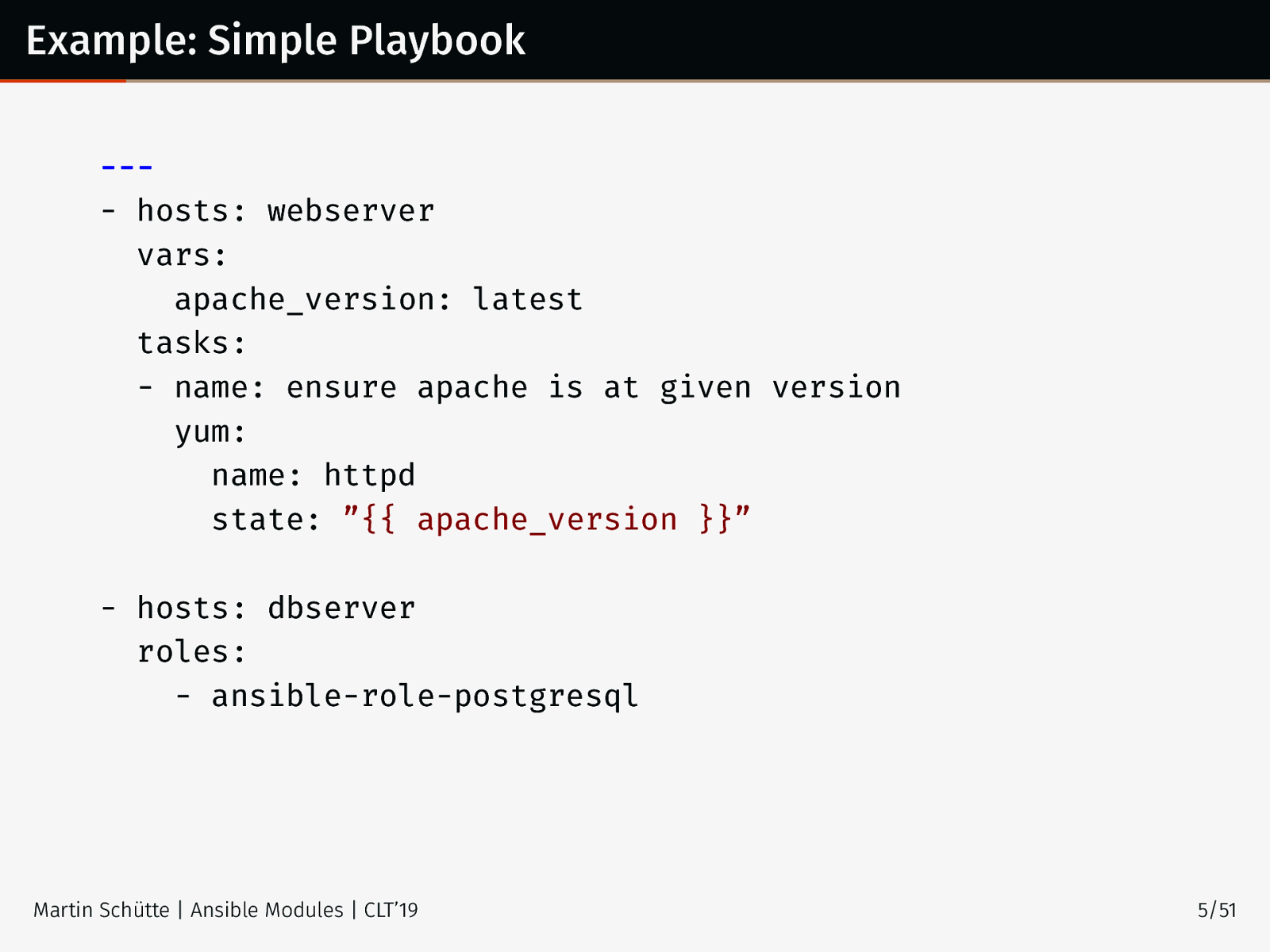
Example: Simple Playbook —- hosts: webserver vars: apache_version: latest tasks: - name: ensure apache is at given version yum: name: httpd state: ”{{ apache_version }}”
- hosts: dbserver roles: - ansible-role-postgresql Martin Schütte | Ansible Modules | CLT’19 5/51
Slide 7
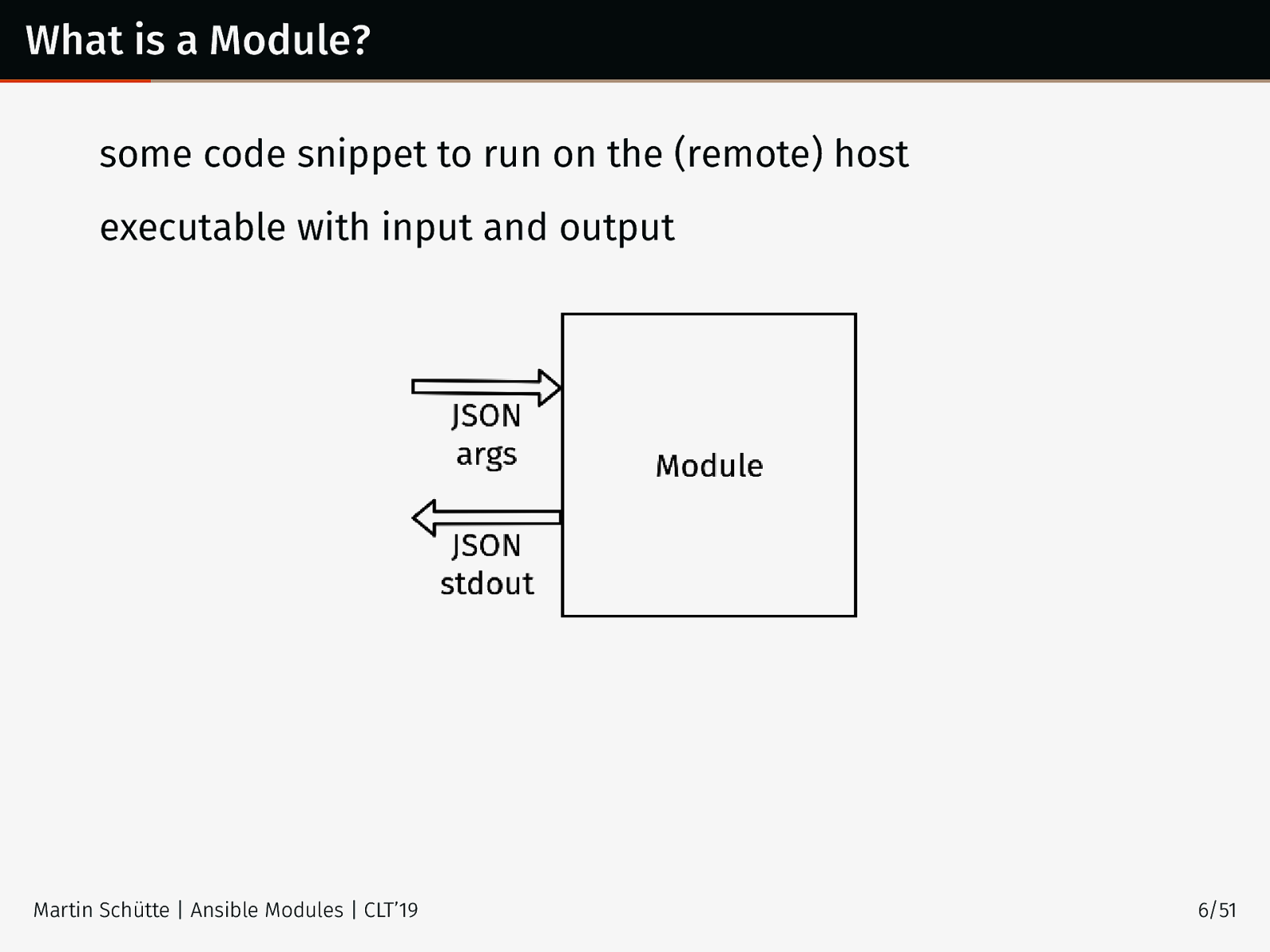
What is a Module? some code snippet to run on the (remote) host executable with input and output Martin Schütte | Ansible Modules | CLT’19 6/51
Slide 8
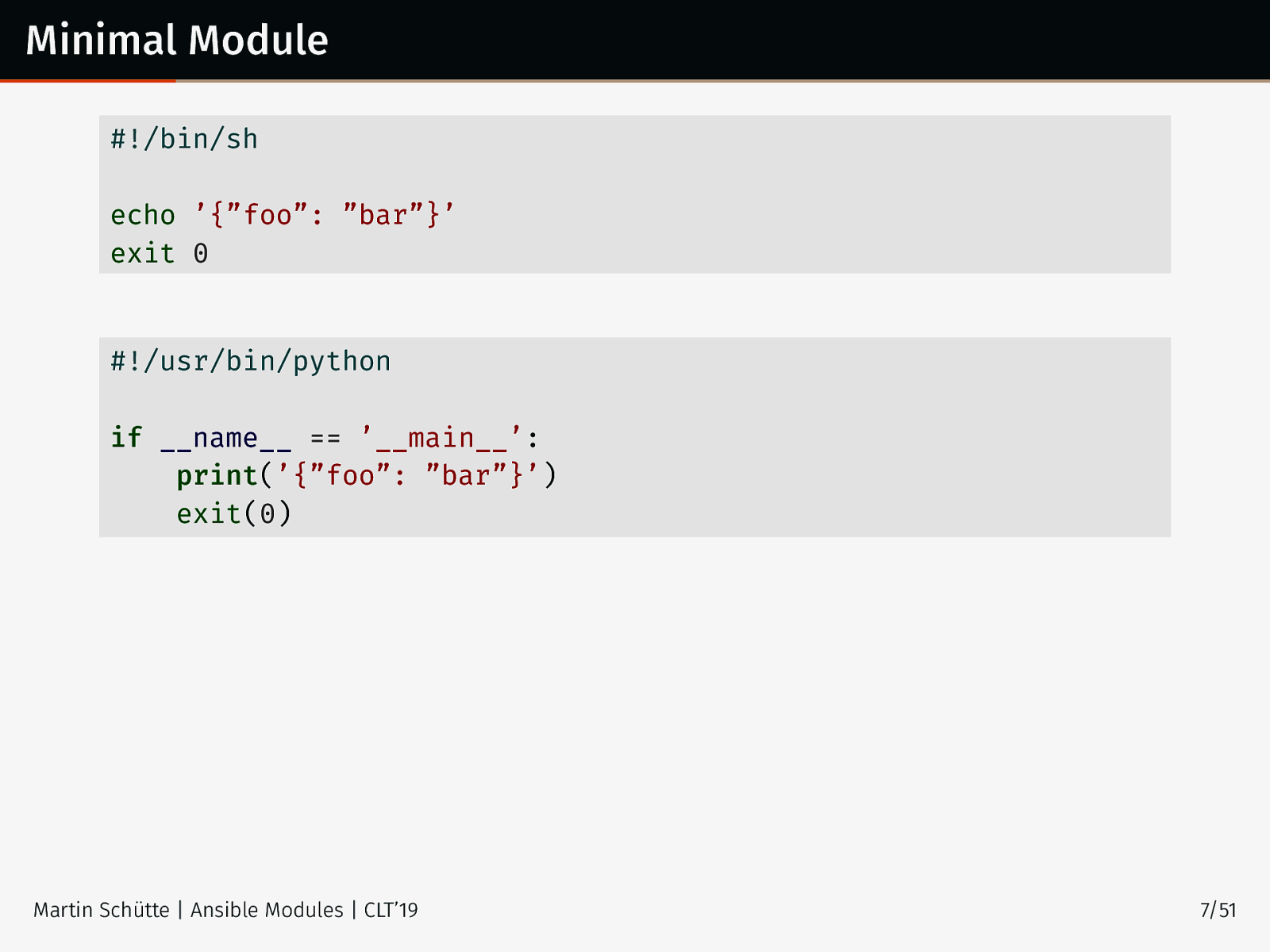
Minimal Module #!/bin/sh echo ’{”foo”: ”bar”}’ exit 0 #!/usr/bin/python if name == ’main’: print(’{”foo”: ”bar”}’) exit(0) Martin Schütte | Ansible Modules | CLT’19 7/51
Slide 9
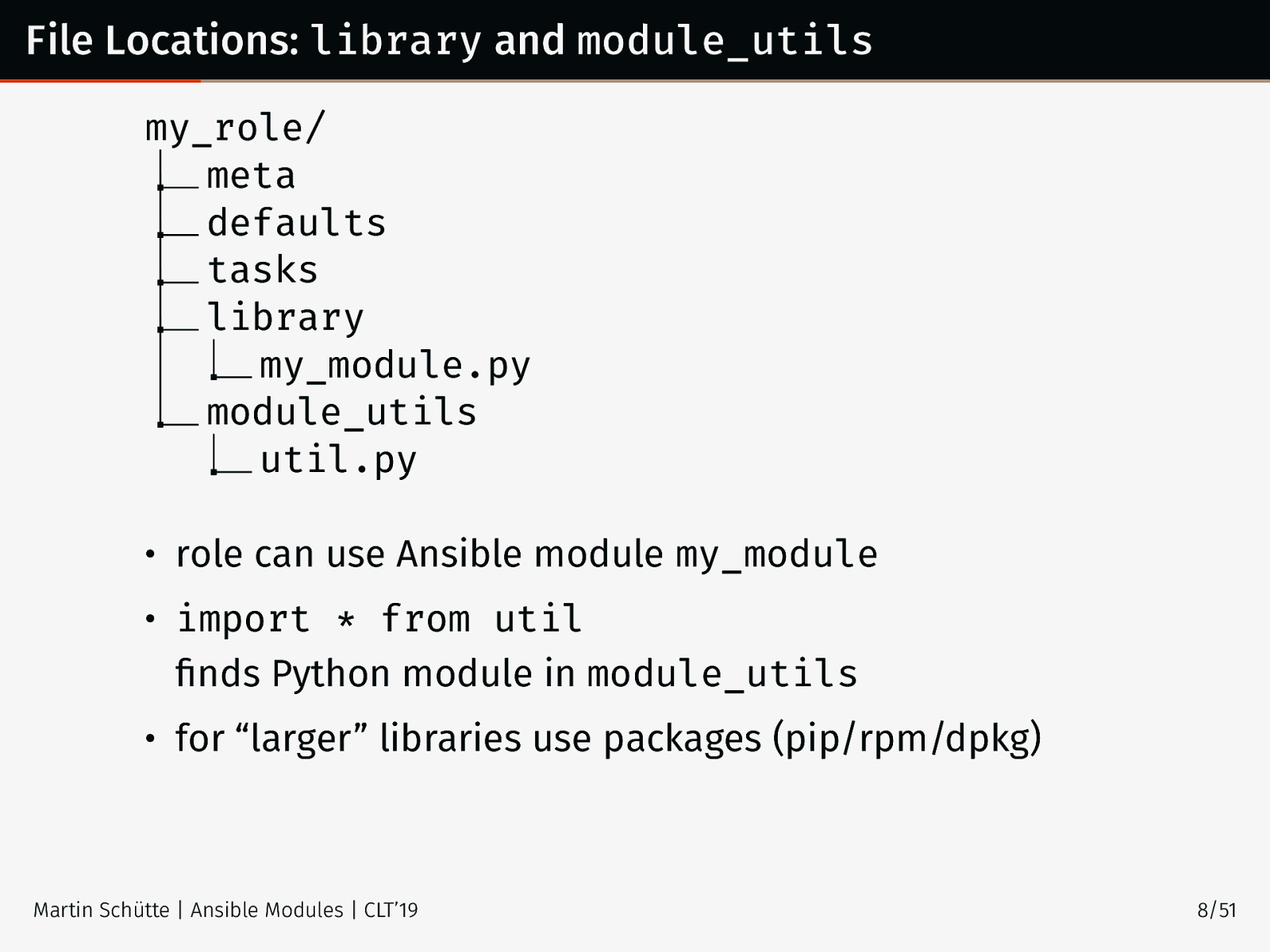
File Locations: library and module_utils my_role/ meta defaults tasks library my_module.py module_utils util.py • role can use Ansible module my_module • import * from util finds Python module in module_utils • for “larger” libraries use packages (pip/rpm/dpkg) Martin Schütte | Ansible Modules | CLT’19 8/51
Slide 10
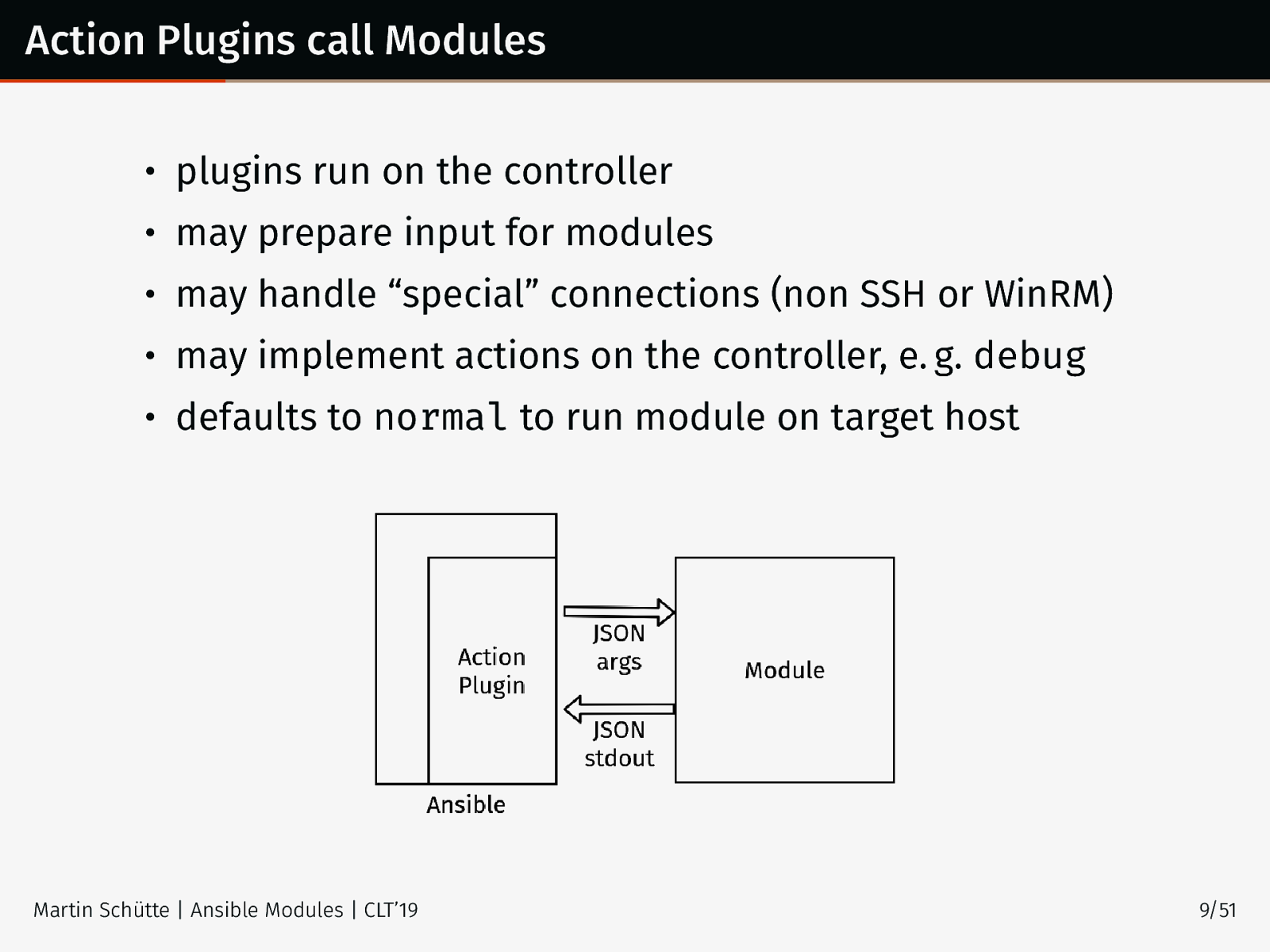
Action Plugins call Modules • plugins run on the controller • may prepare input for modules • may handle “special” connections (non SSH or WinRM) • may implement actions on the controller, e. g. debug • defaults to normal to run module on target host Martin Schütte | Ansible Modules | CLT’19 9/51
Slide 11

Writing Python Modules
Slide 12
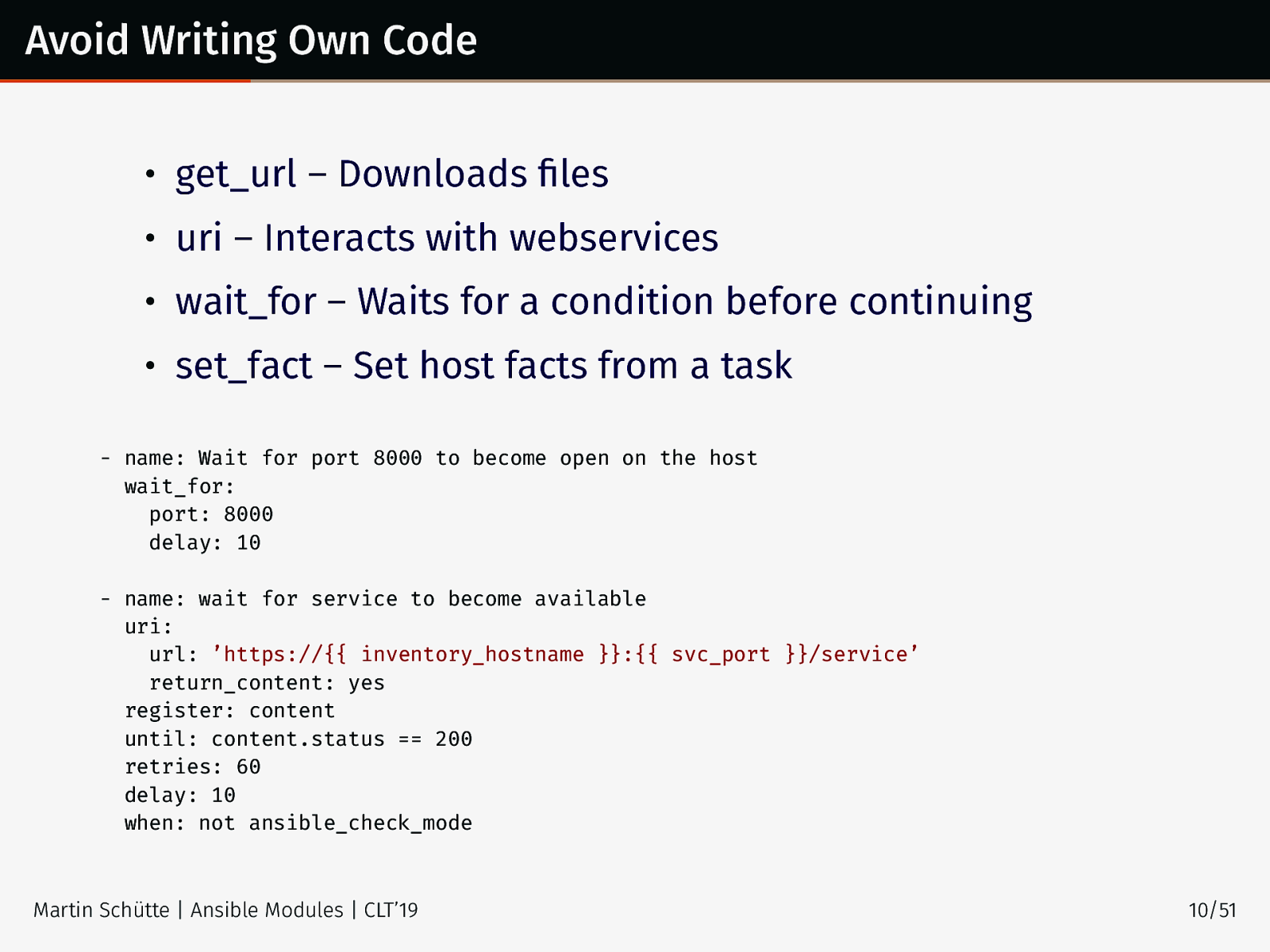
Avoid Writing Own Code • get_url – Downloads files • uri – Interacts with webservices • wait_for – Waits for a condition before continuing • set_fact – Set host facts from a task - name: Wait for port 8000 to become open on the host wait_for: port: 8000 delay: 10 - name: wait for service to become available uri: url: ’https://{{ inventory_hostname }}:{{ svc_port }}/service’ return_content: yes register: content until: content.status == 200 retries: 60 delay: 10 when: not ansible_check_mode Martin Schütte | Ansible Modules | CLT’19 10/51
Slide 13
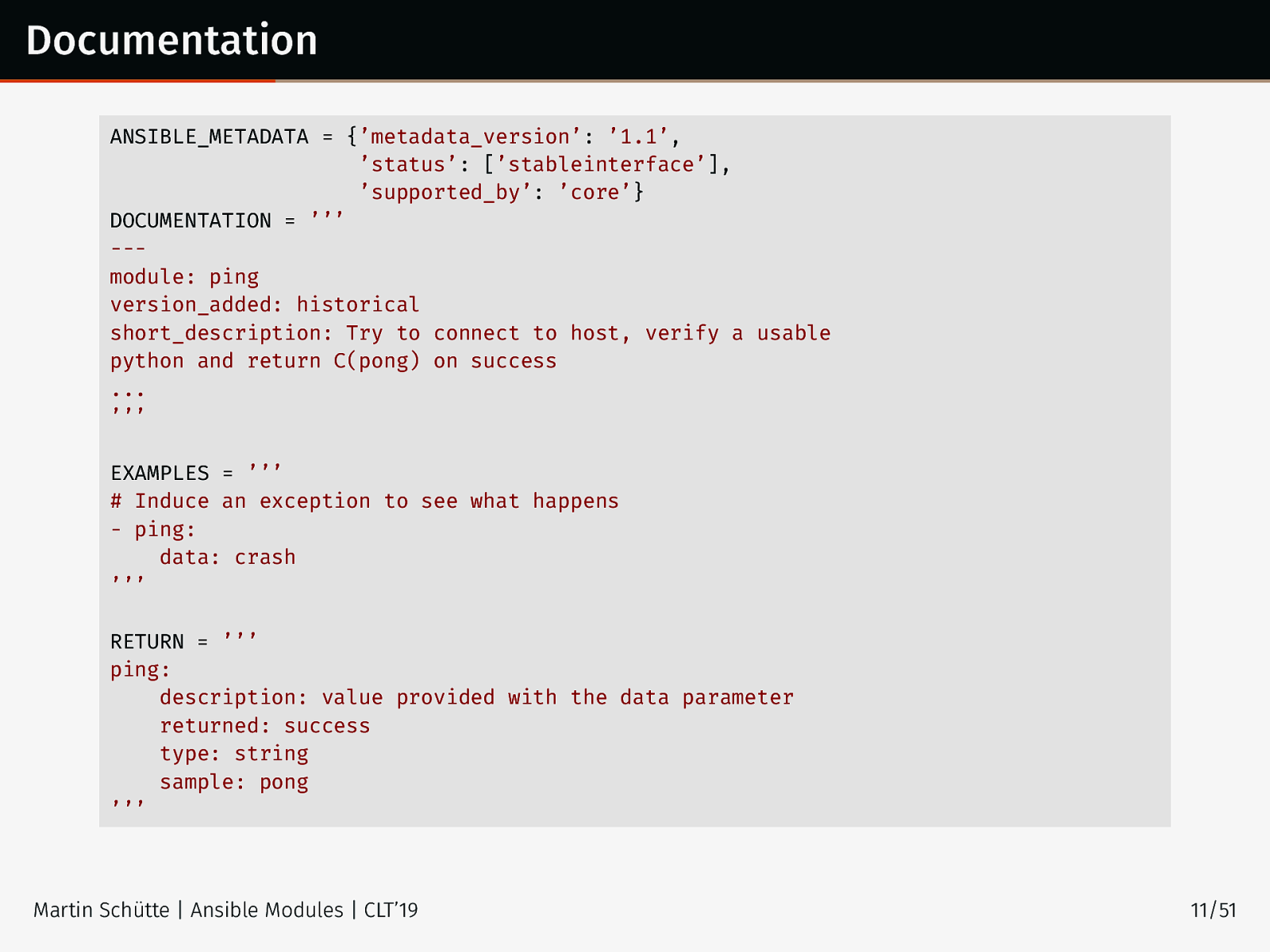
Documentation ANSIBLE_METADATA = {’metadata_version’: ’1.1’, ’status’: [’stableinterface’], ’supported_by’: ’core’} DOCUMENTATION = ’’’ —module: ping version_added: historical short_description: Try to connect to host, verify a usable python and return C(pong) on success … ’’’ EXAMPLES = ’’’ # Induce an exception to see what happens - ping: data: crash ’’’ RETURN = ’’’ ping: description: value provided with the data parameter returned: success type: string sample: pong ’’’ Martin Schütte | Ansible Modules | CLT’19 11/51
Slide 14
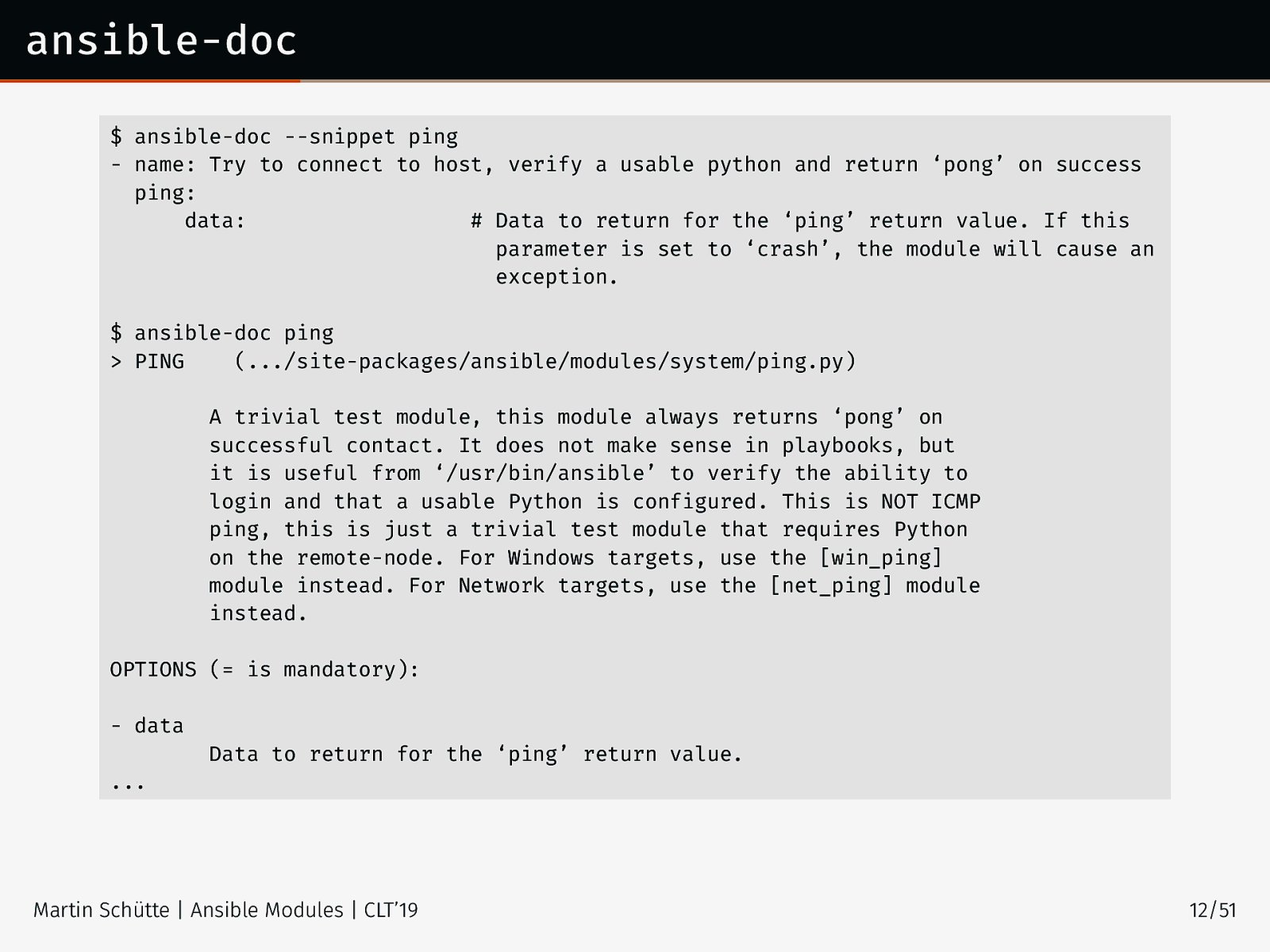
ansible-doc $ ansible-doc —snippet ping - name: Try to connect to host, verify a usable python and return ‘pong’ on success ping: data: # Data to return for the ‘ping’ return value. If this parameter is set to ‘crash’, the module will cause an exception. $ ansible-doc ping > PING (…/site-packages/ansible/modules/system/ping.py) A trivial test module, this module always returns ‘pong’ on successful contact. It does not make sense in playbooks, but it is useful from ‘/usr/bin/ansible’ to verify the ability to login and that a usable Python is configured. This is NOT ICMP ping, this is just a trivial test module that requires Python on the remote-node. For Windows targets, use the [win_ping] module instead. For Network targets, use the [net_ping] module instead. OPTIONS (= is mandatory): - data Data to return for the ‘ping’ return value. … Martin Schütte | Ansible Modules | CLT’19 12/51
Slide 15

ping.py from ansible.module_utils.basic import AnsibleModule def main(): module = AnsibleModule( argument_spec=dict( data=dict(type=’str’, default=’pong’), ), supports_check_mode=True ) if module.params[’data’] == ’crash’: raise Exception(”boom”) result = dict( ping=module.params[’data’], ) module.exit_json(**result) if name == ’main’: main() Martin Schütte | Ansible Modules | CLT’19 13/51
Slide 16
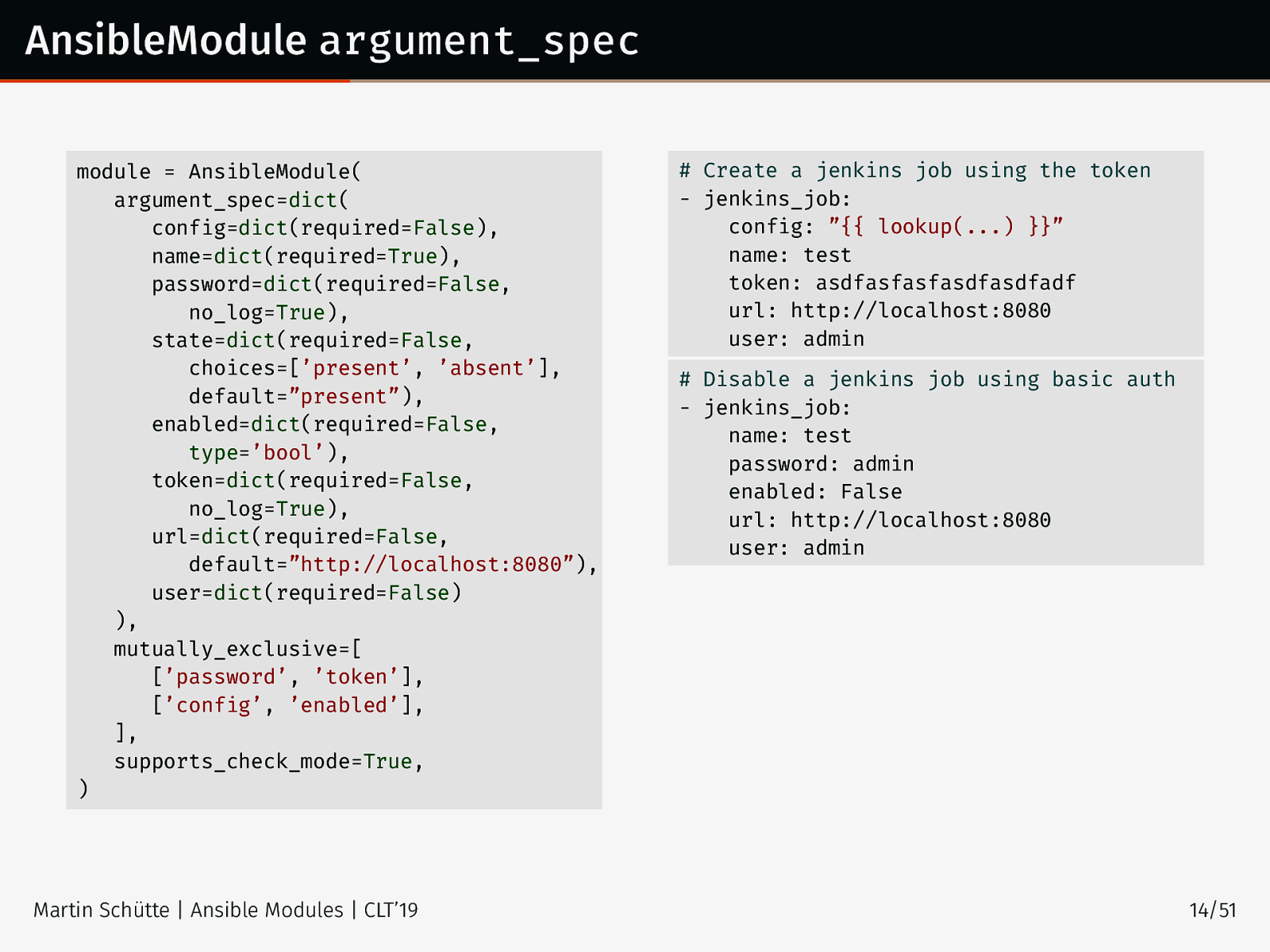
AnsibleModule argument_spec module = AnsibleModule( argument_spec=dict( config=dict(required=False), name=dict(required=True), password=dict(required=False, no_log=True), state=dict(required=False, choices=[’present’, ’absent’], default=”present”), enabled=dict(required=False, type=’bool’), token=dict(required=False, no_log=True), url=dict(required=False, default=”http://localhost:8080”), user=dict(required=False) ), mutually_exclusive=[ [’password’, ’token’], [’config’, ’enabled’], ], supports_check_mode=True, ) Martin Schütte | Ansible Modules | CLT’19
Create a jenkins job using the token - jenkins_job: config: ”{{ lookup(…) }}” name: test token: asdfasfasfasdfasdfadf url: http://localhost:8080 user: admin # Disable a jenkins job using basic auth - jenkins_job: name: test password: admin enabled: False url: http://localhost:8080 user: admin
14/51
Slide 17
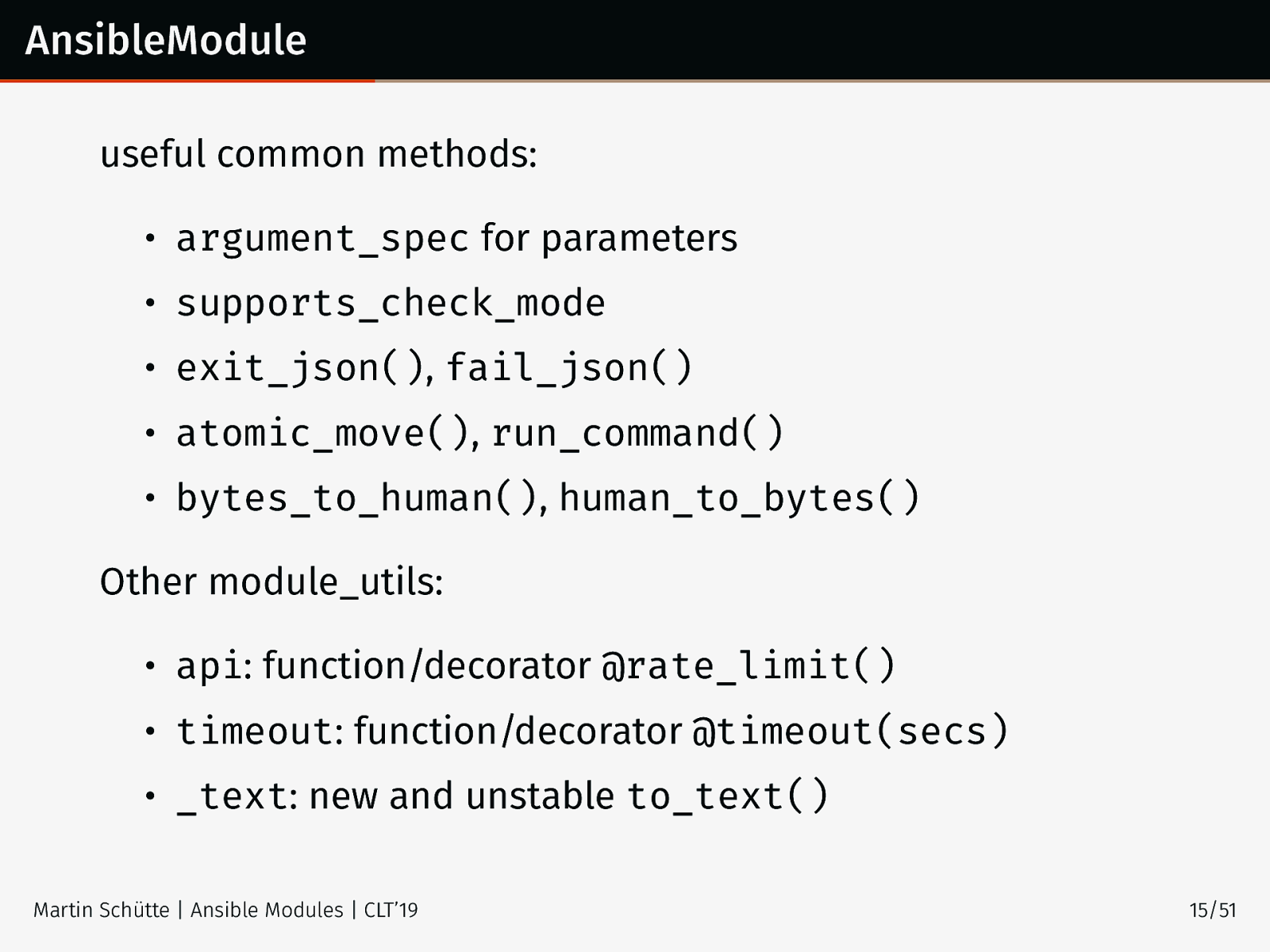
AnsibleModule useful common methods: • argument_spec for parameters • supports_check_mode • exit_json(), fail_json() • atomic_move(), run_command() • bytes_to_human(), human_to_bytes() Other module_utils: • api: function/decorator @rate_limit() • timeout: function/decorator @timeout(secs) • _text: new and unstable to_text() Martin Schütte | Ansible Modules | CLT’19 15/51
Slide 18
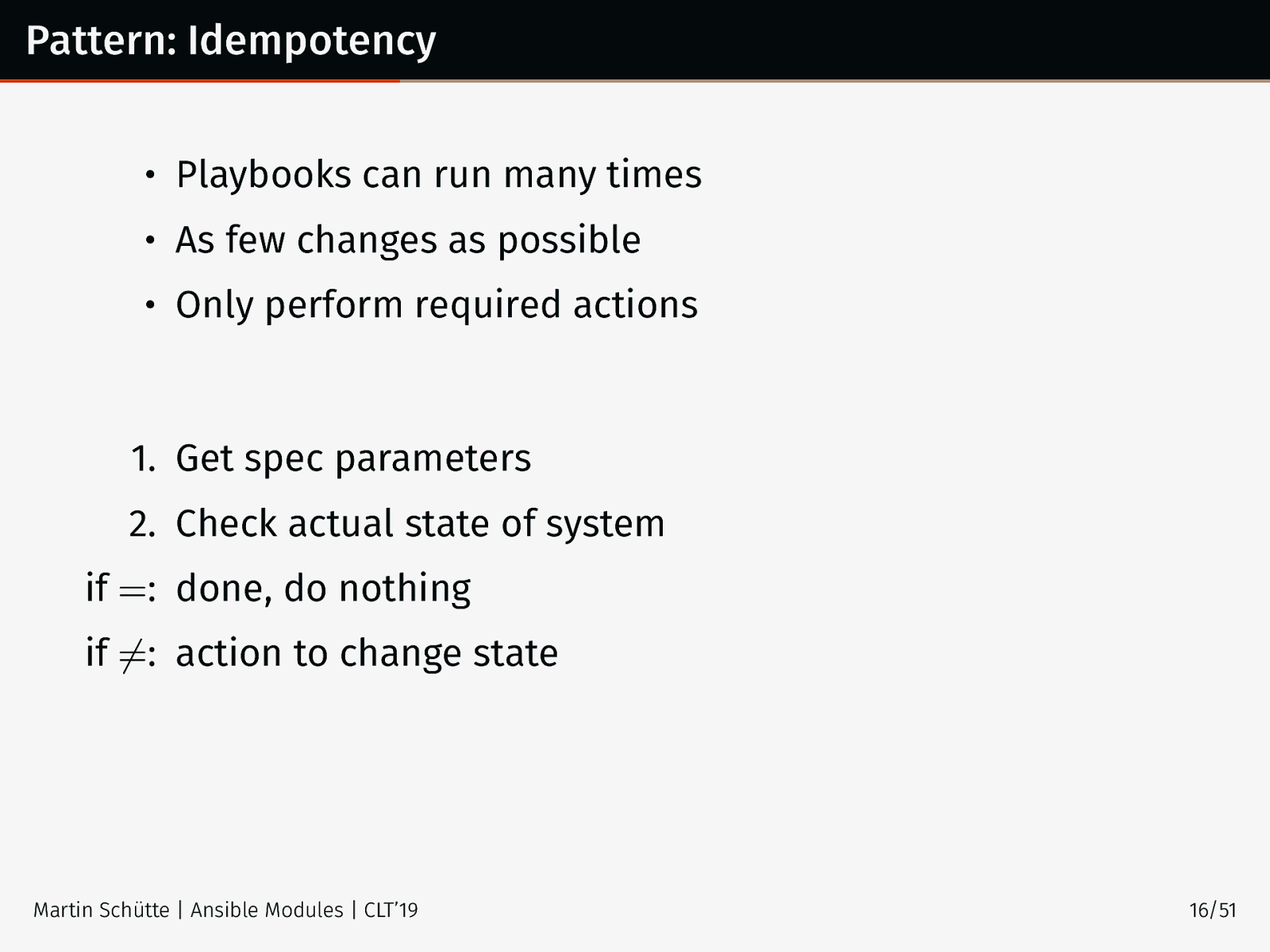
Pattern: Idempotency • Playbooks can run many times • As few changes as possible • Only perform required actions
- Get spec parameters 2. Check actual state of system if =: done, do nothing if ̸=: action to change state Martin Schütte | Ansible Modules | CLT’19 16/51
Slide 19
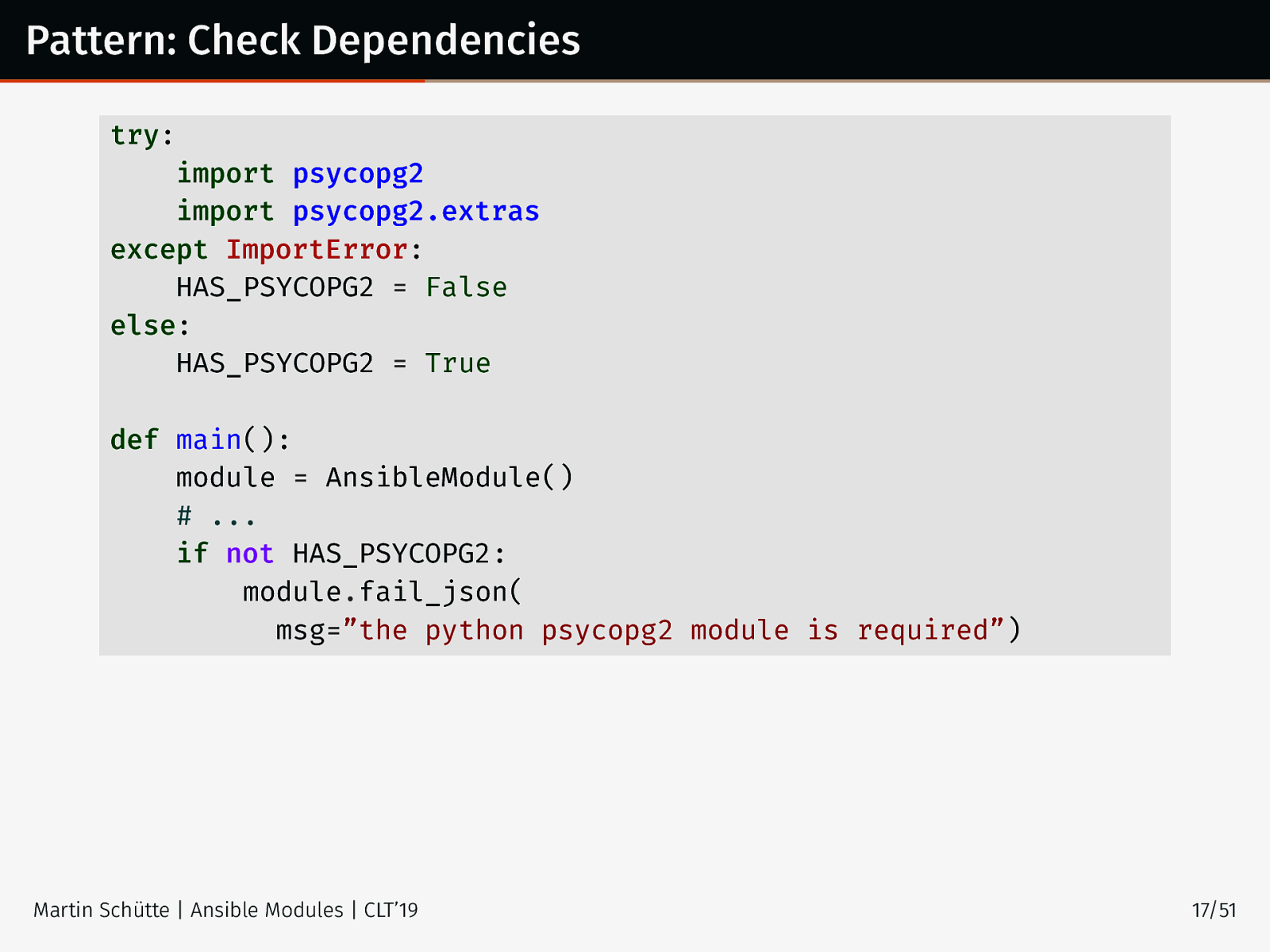
Pattern: Check Dependencies try: import psycopg2 import psycopg2.extras except ImportError: HAS_PSYCOPG2 = False else: HAS_PSYCOPG2 = True def main(): module = AnsibleModule() # … if not HAS_PSYCOPG2: module.fail_json( msg=”the python psycopg2 module is required”) Martin Schütte | Ansible Modules | CLT’19 17/51
Slide 20
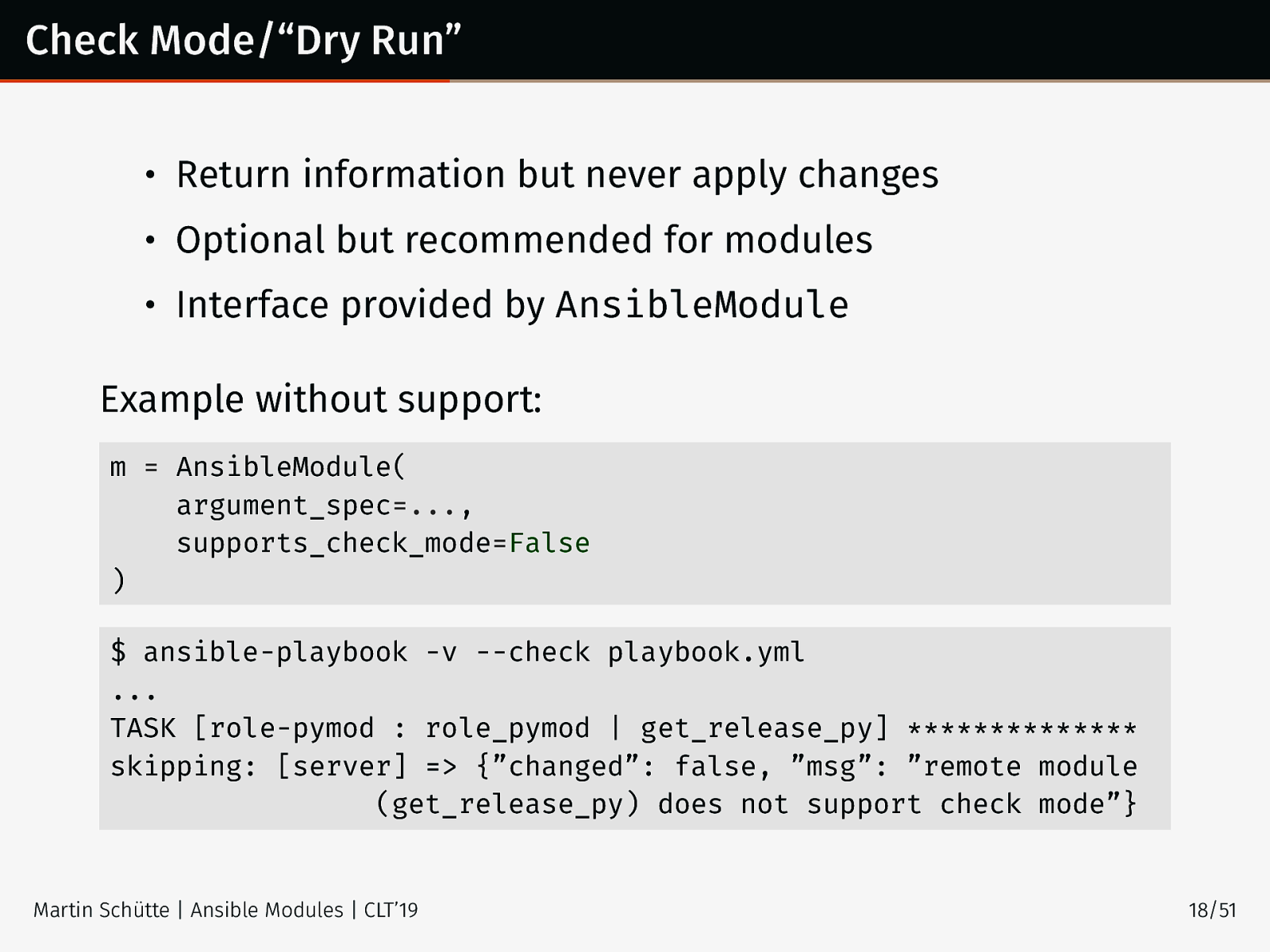
Check Mode/“Dry Run” • Return information but never apply changes • Optional but recommended for modules • Interface provided by AnsibleModule Example without support: m = AnsibleModule( argument_spec=…, supports_check_mode=False ) $ ansible-playbook -v —check playbook.yml … TASK [role-pymod : role_pymod | get_release_py] ************** skipping: [server] => {”changed”: false, ”msg”: ”remote module (get_release_py) does not support check mode”} Martin Schütte | Ansible Modules | CLT’19 18/51
Slide 21
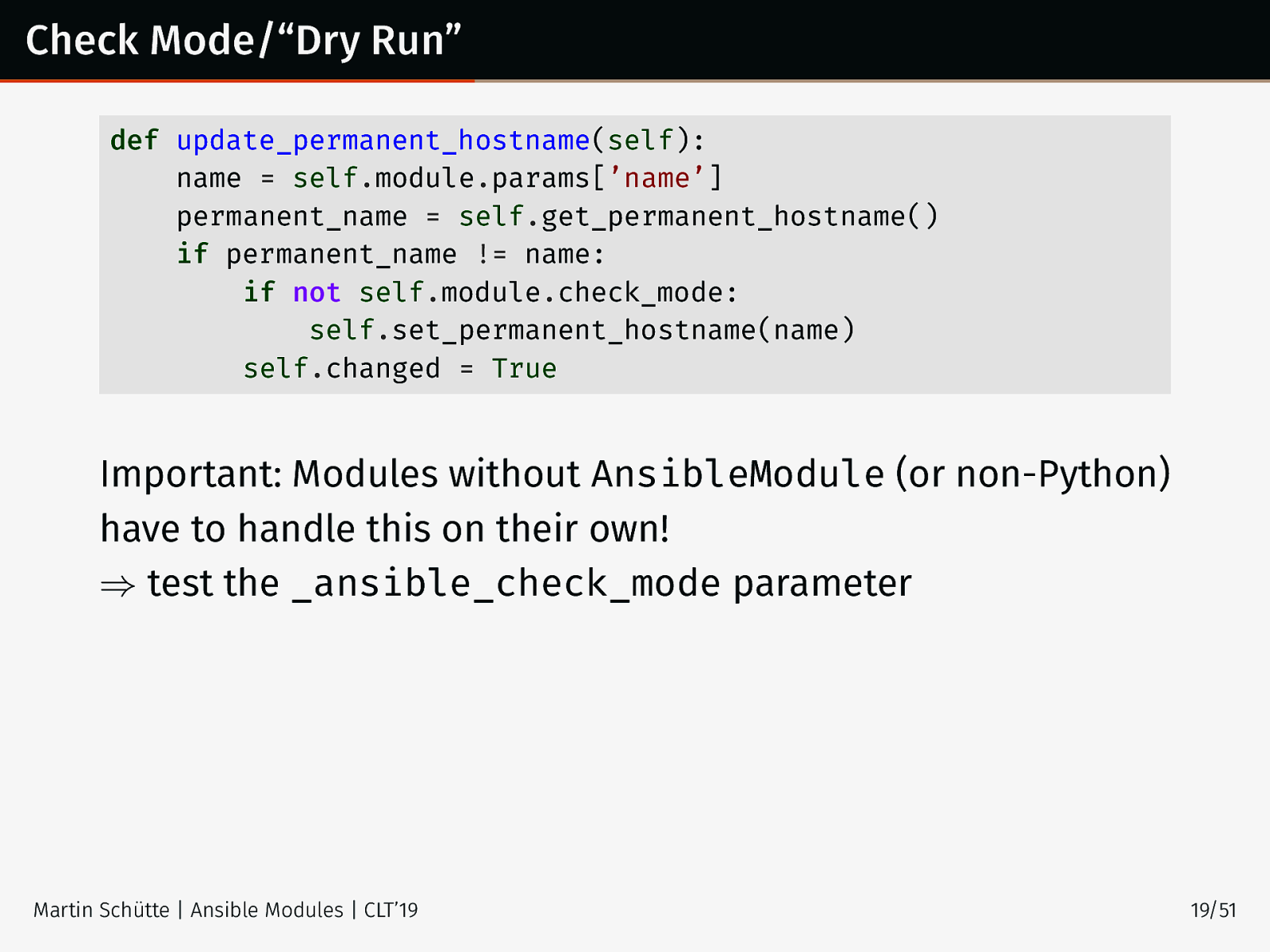
Check Mode/“Dry Run” def update_permanent_hostname(self): name = self.module.params[’name’] permanent_name = self.get_permanent_hostname() if permanent_name != name: if not self.module.check_mode: self.set_permanent_hostname(name) self.changed = True Important: Modules without AnsibleModule (or non-Python) have to handle this on their own! ⇒ test the _ansible_check_mode parameter Martin Schütte | Ansible Modules | CLT’19 19/51
Slide 22
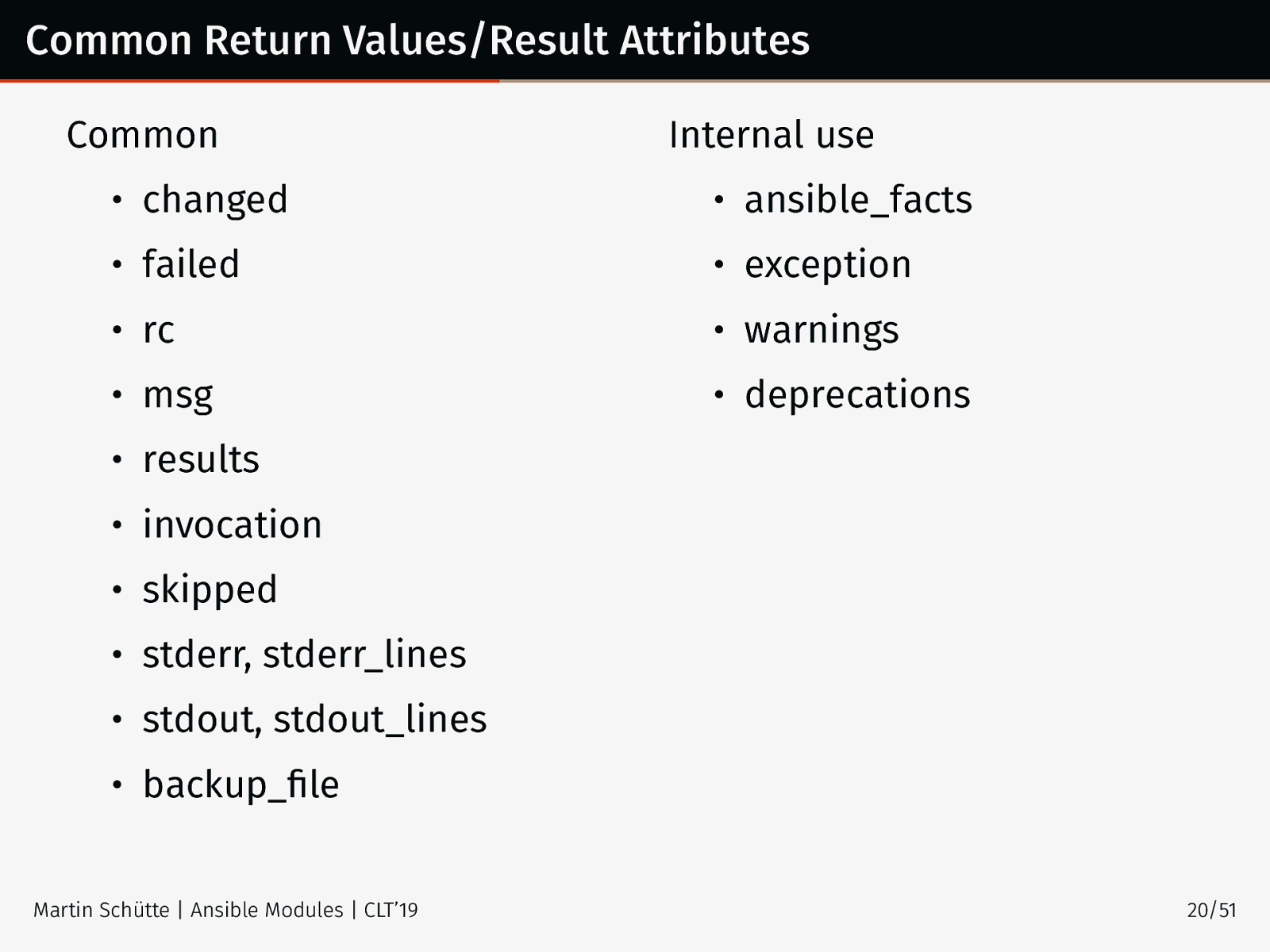
Common Return Values/Result Attributes Common Internal use • changed • ansible_facts • failed • exception • rc • warnings • msg • deprecations • results • invocation • skipped • stderr, stderr_lines • stdout, stdout_lines • backup_file Martin Schütte | Ansible Modules | CLT’19 20/51
Slide 23
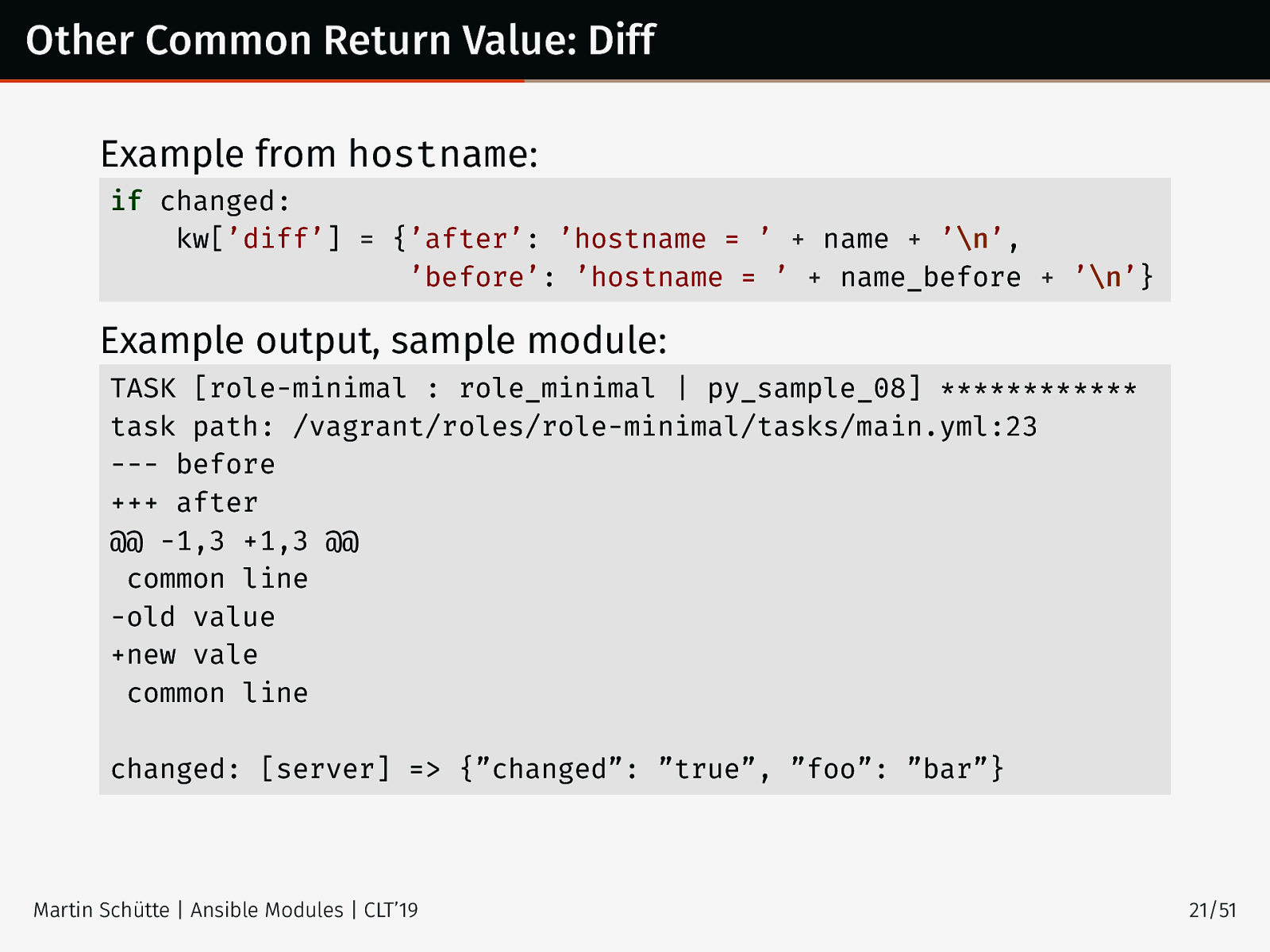
Other Common Return Value: Diff Example from hostname: if changed: kw[’diff’] = {’after’: ’hostname = ’ + name + ’\n’, ’before’: ’hostname = ’ + name_before + ’\n’} Example output, sample module: TASK [role-minimal : role_minimal | py_sample_08] ************ task path: /vagrant/roles/role-minimal/tasks/main.yml:23 —- before +++ after @@ -1,3 +1,3 @@ common line -old value +new vale common line changed: [server] => {”changed”: ”true”, ”foo”: ”bar”} Martin Schütte | Ansible Modules | CLT’19 21/51
Slide 24
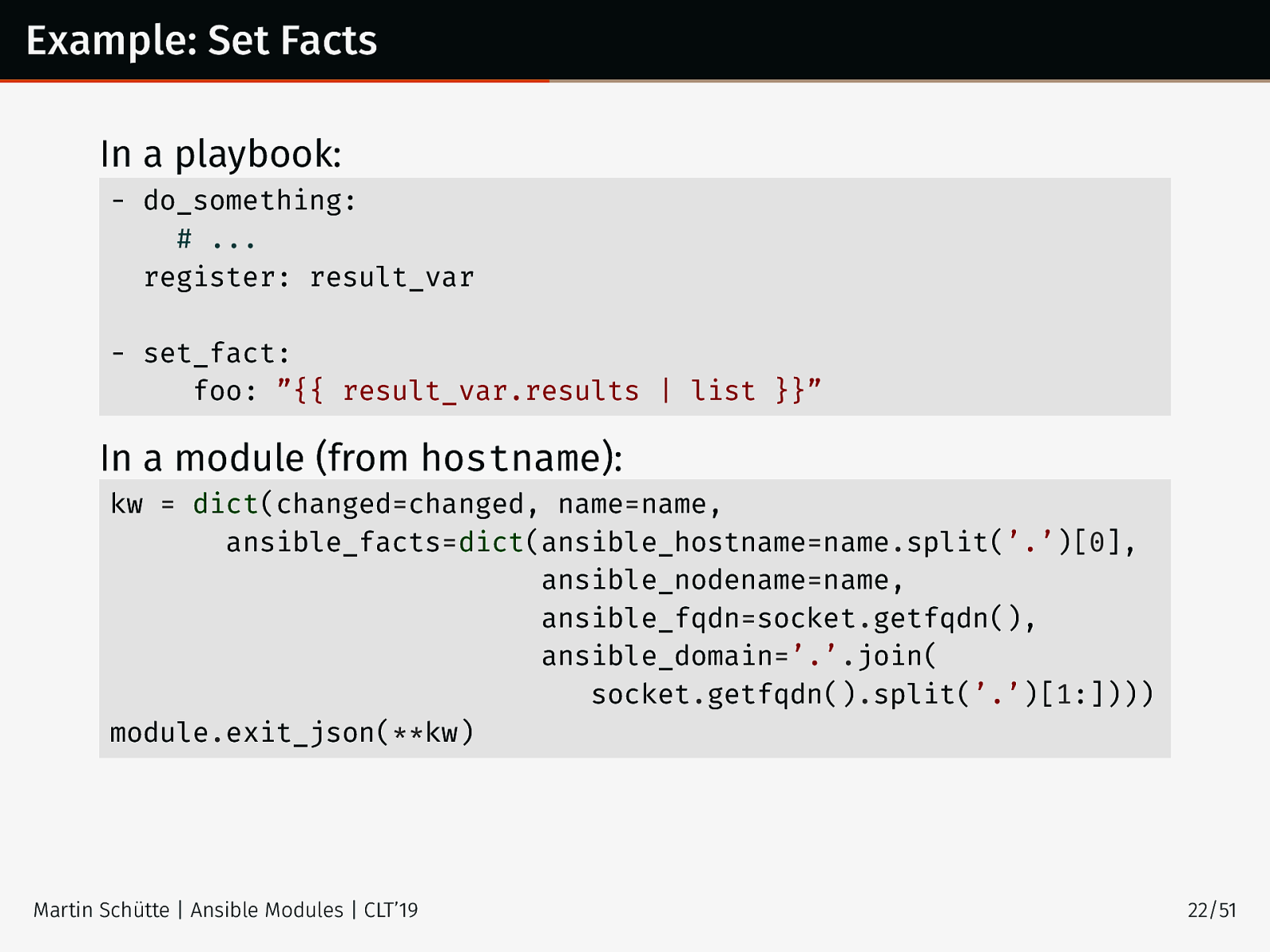
Example: Set Facts In a playbook: - do_something: # … register: result_var - set_fact: foo: ”{{ result_var.results | list }}” In a module (from hostname): kw = dict(changed=changed, name=name, ansible_facts=dict(ansible_hostname=name.split(’.’)[0], ansible_nodename=name, ansible_fqdn=socket.getfqdn(), ansible_domain=’.’.join( socket.getfqdn().split(’.’)[1:]))) module.exit_json(**kw) Martin Schütte | Ansible Modules | CLT’19 22/51
Slide 25
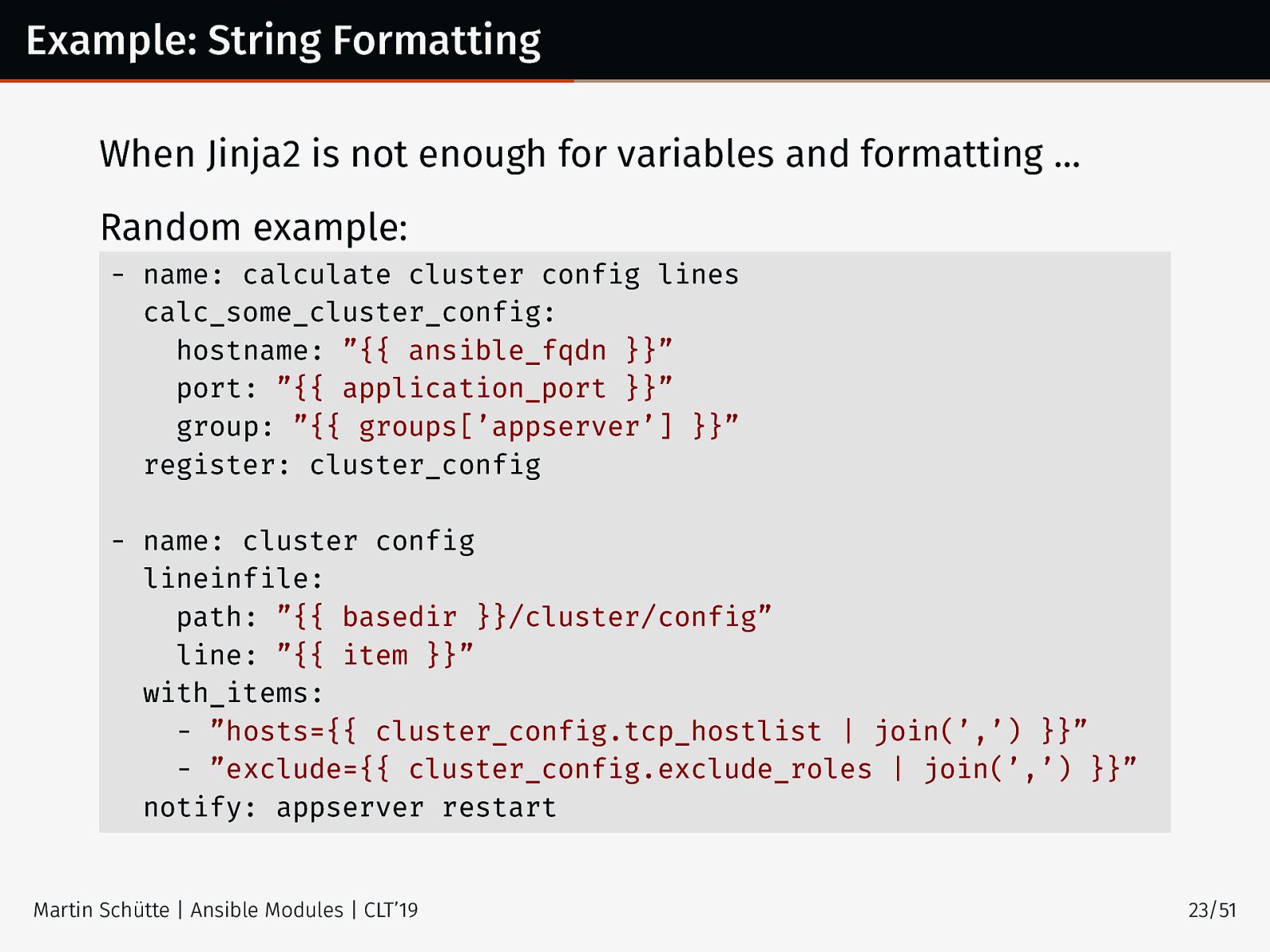
Example: String Formatting When Jinja2 is not enough for variables and formatting … Random example: - name: calculate cluster config lines calc_some_cluster_config: hostname: ”{{ ansible_fqdn }}” port: ”{{ application_port }}” group: ”{{ groups[’appserver’] }}” register: cluster_config - name: cluster config lineinfile: path: ”{{ basedir }}/cluster/config” line: ”{{ item }}” with_items: - ”hosts={{ cluster_config.tcp_hostlist | join(’,’) }}” - ”exclude={{ cluster_config.exclude_roles | join(’,’) }}” notify: appserver restart Martin Schütte | Ansible Modules | CLT’19 23/51
Slide 26
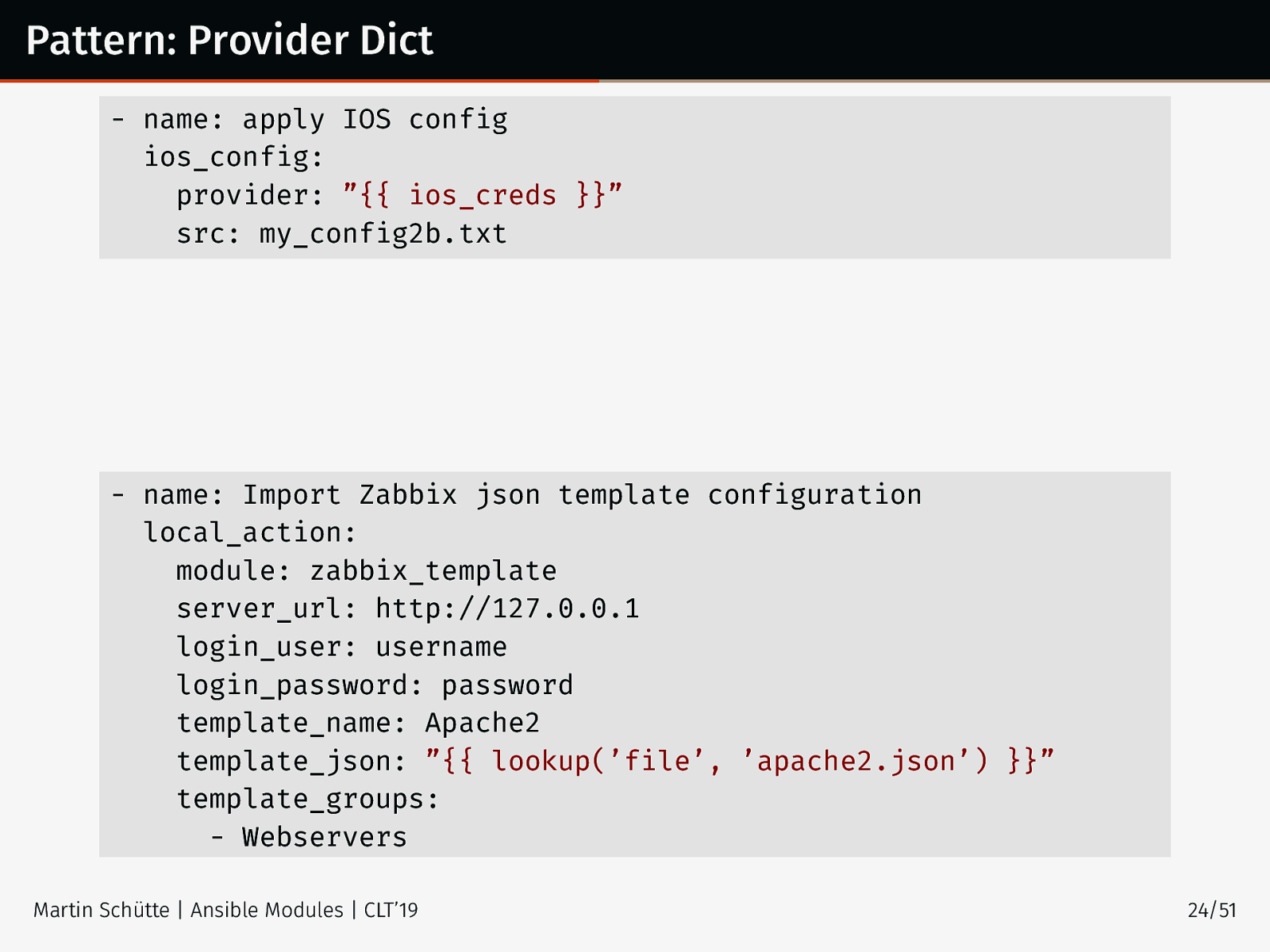
Pattern: Provider Dict - name: apply IOS config ios_config: provider: ”{{ ios_creds }}” src: my_config2b.txt
- name: Import Zabbix json template configuration local_action: module: zabbix_template server_url: http://127.0.0.1 login_user: username login_password: password template_name: Apache2 template_json: ”{{ lookup(’file’, ’apache2.json’) }}” template_groups: - Webservers Martin Schütte | Ansible Modules | CLT’19 24/51
Slide 27
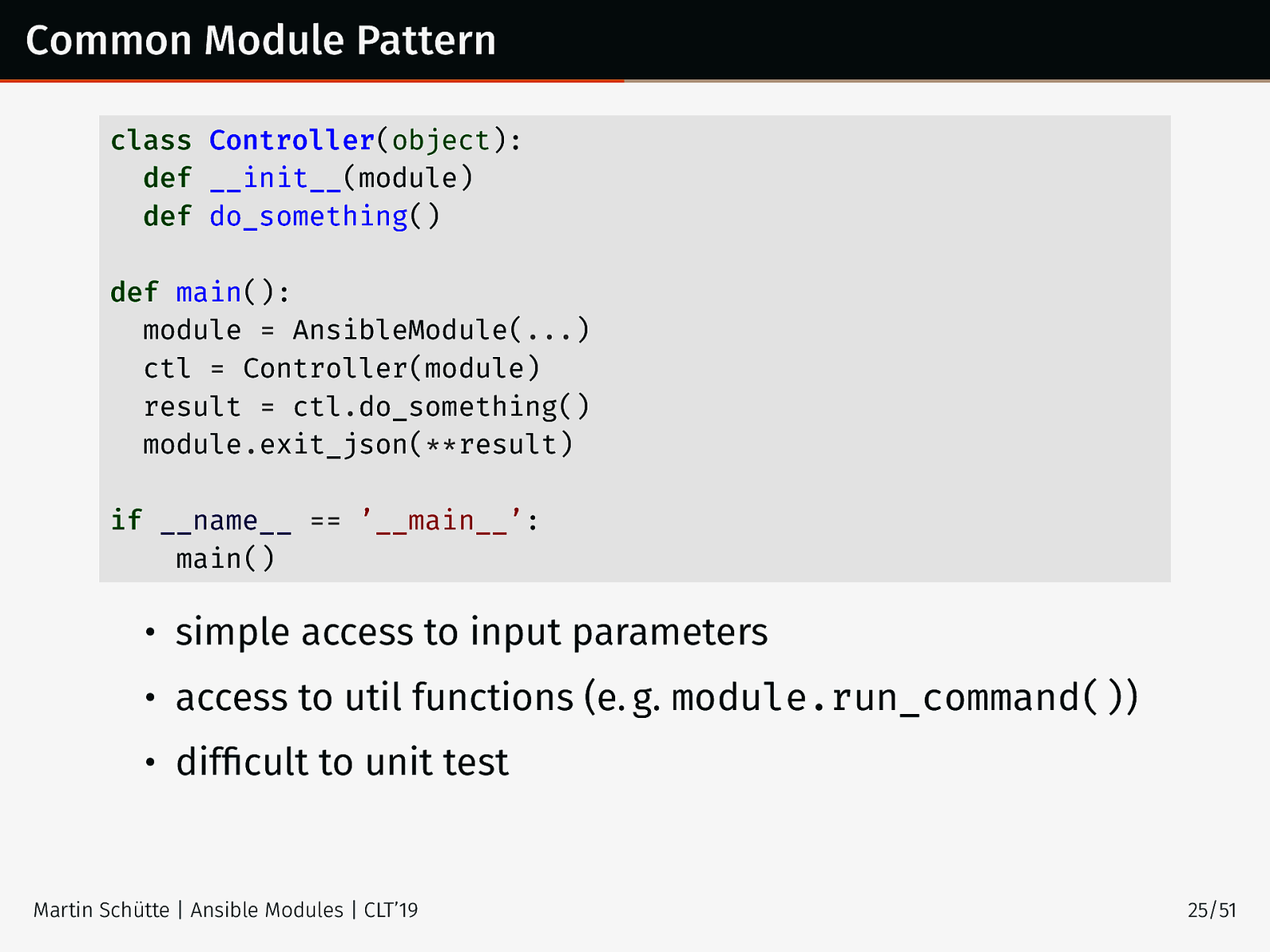
Common Module Pattern class Controller(object): def init(module) def do_something() def main(): module = AnsibleModule(…) ctl = Controller(module) result = ctl.do_something() module.exit_json(**result) if name == ’main’: main() • simple access to input parameters • access to util functions (e. g. module.run_command()) • difficult to unit test Martin Schütte | Ansible Modules | CLT’19 25/51
Slide 28
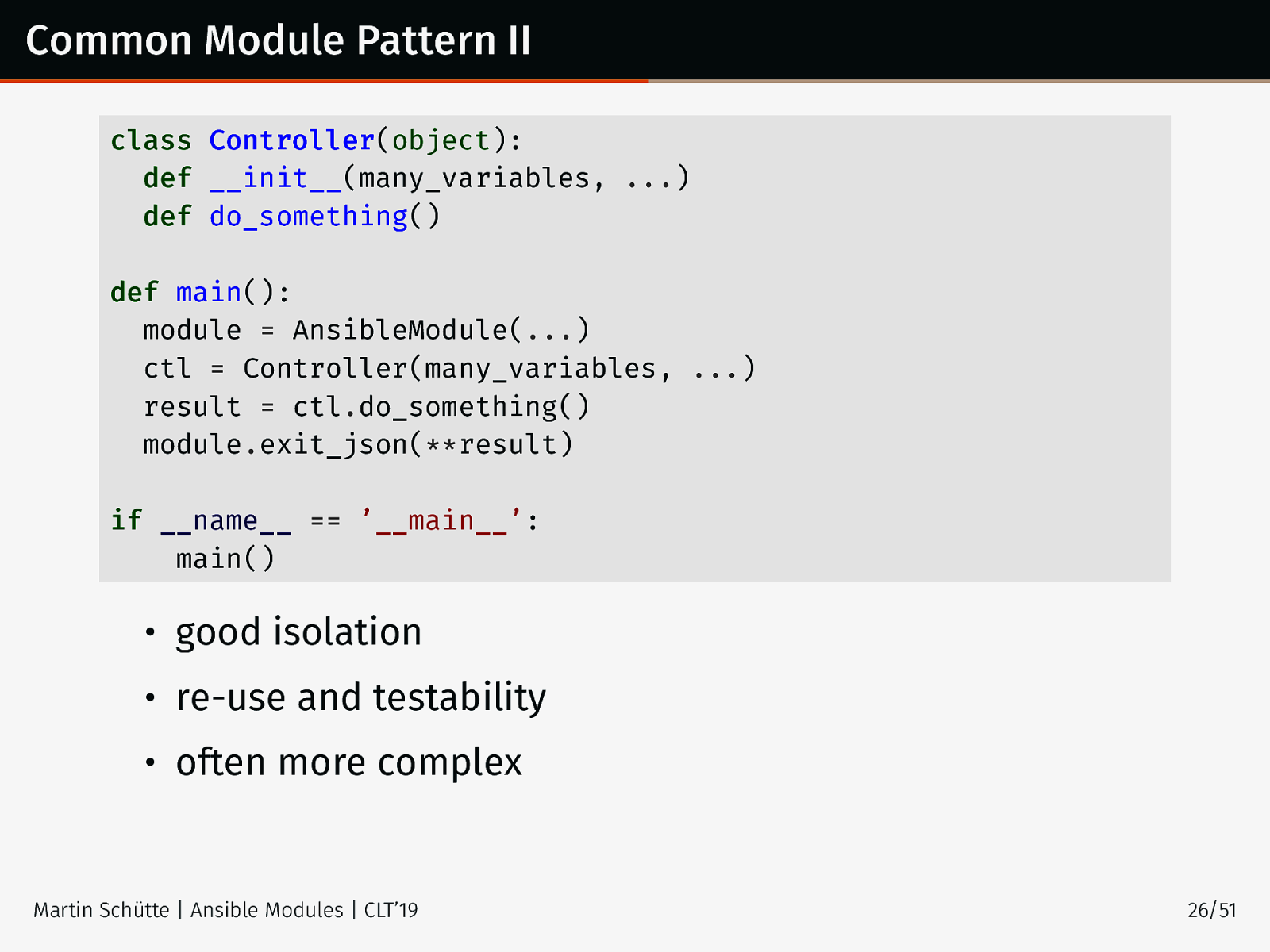
Common Module Pattern II class Controller(object): def init(many_variables, …) def do_something() def main(): module = AnsibleModule(…) ctl = Controller(many_variables, …) result = ctl.do_something() module.exit_json(**result) if name == ’main’: main() • good isolation • re-use and testability • often more complex Martin Schütte | Ansible Modules | CLT’19 26/51
Slide 29

Module Execution – In-Depth
Slide 30
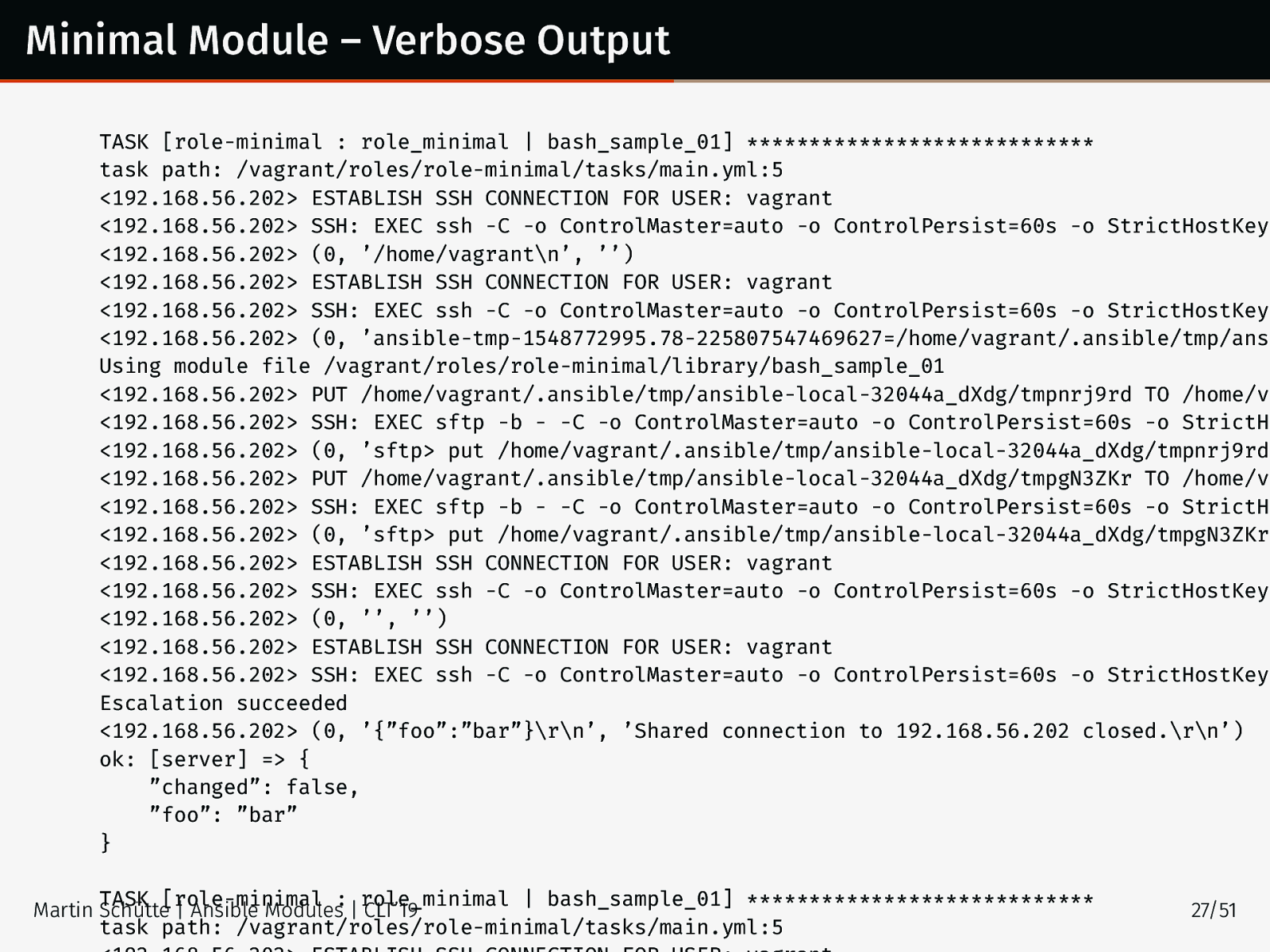
Minimal Module – Verbose Output TASK [role-minimal : role_minimal | bash_sample_01] **************************** task path: /vagrant/roles/role-minimal/tasks/main.yml:5 <192.168.56.202> ESTABLISH SSH CONNECTION FOR USER: vagrant <192.168.56.202> SSH: EXEC ssh -C -o ControlMaster=auto -o ControlPersist=60s -o StrictHostKeyC <192.168.56.202> (0, ’/home/vagrant\n’, ’’) <192.168.56.202> ESTABLISH SSH CONNECTION FOR USER: vagrant <192.168.56.202> SSH: EXEC ssh -C -o ControlMaster=auto -o ControlPersist=60s -o StrictHostKeyC <192.168.56.202> (0, ’ansible-tmp-1548772995.78-225807547469627=/home/vagrant/.ansible/tmp/ansi Using module file /vagrant/roles/role-minimal/library/bash_sample_01 <192.168.56.202> PUT /home/vagrant/.ansible/tmp/ansible-local-32044a_dXdg/tmpnrj9rd TO /home/va <192.168.56.202> SSH: EXEC sftp -b - -C -o ControlMaster=auto -o ControlPersist=60s -o StrictHo <192.168.56.202> (0, ’sftp> put /home/vagrant/.ansible/tmp/ansible-local-32044a_dXdg/tmpnrj9rd <192.168.56.202> PUT /home/vagrant/.ansible/tmp/ansible-local-32044a_dXdg/tmpgN3ZKr TO /home/va <192.168.56.202> SSH: EXEC sftp -b - -C -o ControlMaster=auto -o ControlPersist=60s -o StrictHo <192.168.56.202> (0, ’sftp> put /home/vagrant/.ansible/tmp/ansible-local-32044a_dXdg/tmpgN3ZKr <192.168.56.202> ESTABLISH SSH CONNECTION FOR USER: vagrant <192.168.56.202> SSH: EXEC ssh -C -o ControlMaster=auto -o ControlPersist=60s -o StrictHostKeyC <192.168.56.202> (0, ’’, ’’) <192.168.56.202> ESTABLISH SSH CONNECTION FOR USER: vagrant <192.168.56.202> SSH: EXEC ssh -C -o ControlMaster=auto -o ControlPersist=60s -o StrictHostKeyC Escalation succeeded <192.168.56.202> (0, ’{”foo”:”bar”}\r\n’, ’Shared connection to 192.168.56.202 closed.\r\n’) ok: [server] => { ”changed”: false, ”foo”: ”bar” } TASK [role-minimal : role_minimal | bash_sample_01] **************************** Martin Schütte | Ansible Modules | CLT’19 task path: /vagrant/roles/role-minimal/tasks/main.yml:5 27/51
Slide 31
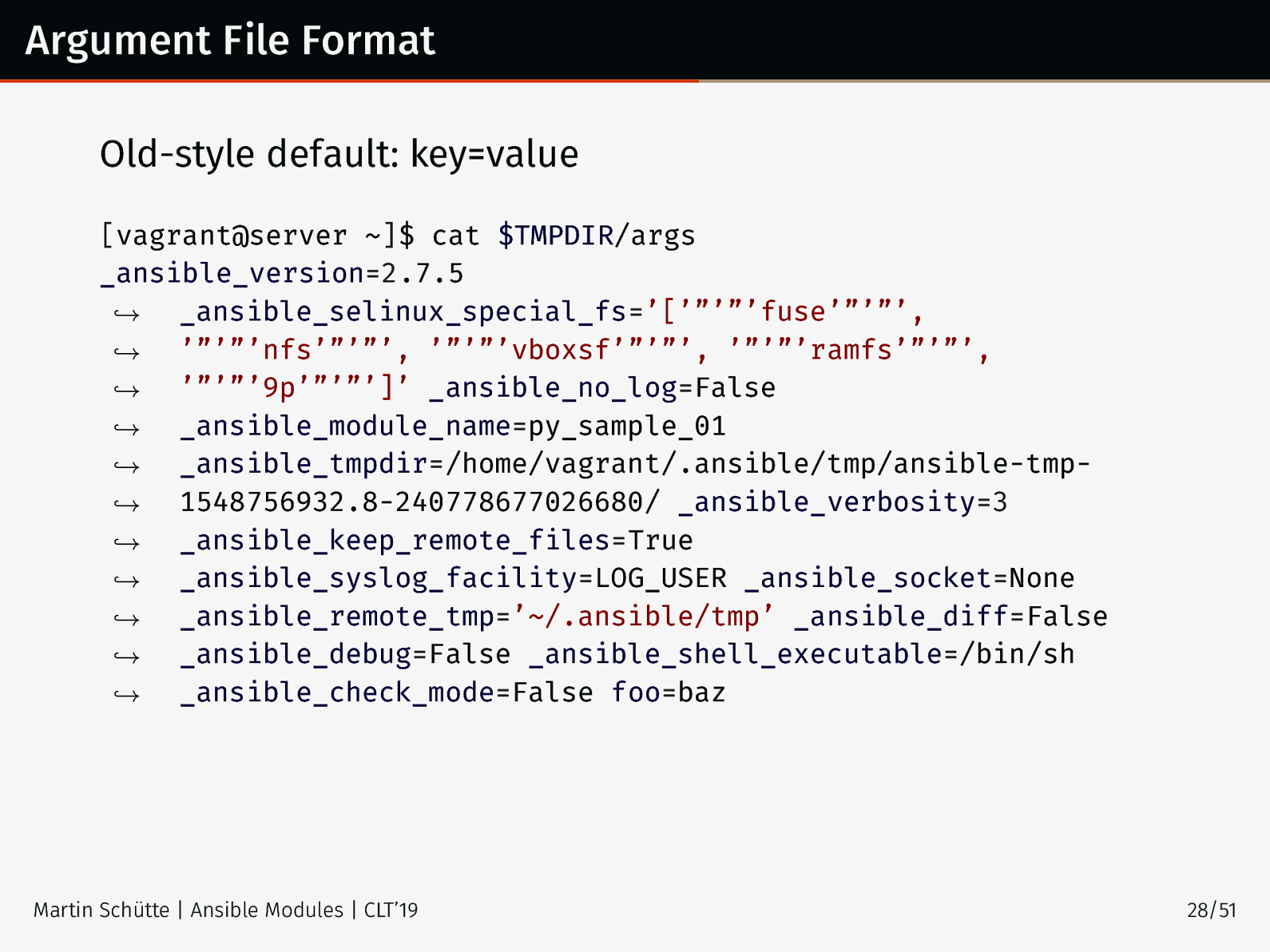
Argument File Format Old-style default: key=value [vagrant@server ~]$ cat $TMPDIR/args _ansible_version=2.7.5 ,→ _ansible_selinux_special_fs=’[’”’”’fuse’”’”’, ,→ ’”’”’nfs’”’”’, ’”’”’vboxsf’”’”’, ’”’”’ramfs’”’”’, ,→ ’”’”’9p’”’”’]’ _ansible_no_log=False ,→ _ansible_module_name=py_sample_01 ,→ _ansible_tmpdir=/home/vagrant/.ansible/tmp/ansible-tmp,→ 1548756932.8-240778677026680/ _ansible_verbosity=3 ,→ _ansible_keep_remote_files=True ,→ _ansible_syslog_facility=LOG_USER _ansible_socket=None ,→ _ansible_remote_tmp=’~/.ansible/tmp’ _ansible_diff=False ,→ _ansible_debug=False _ansible_shell_executable=/bin/sh ,→ _ansible_check_mode=False foo=baz Martin Schütte | Ansible Modules | CLT’19 28/51
Slide 32
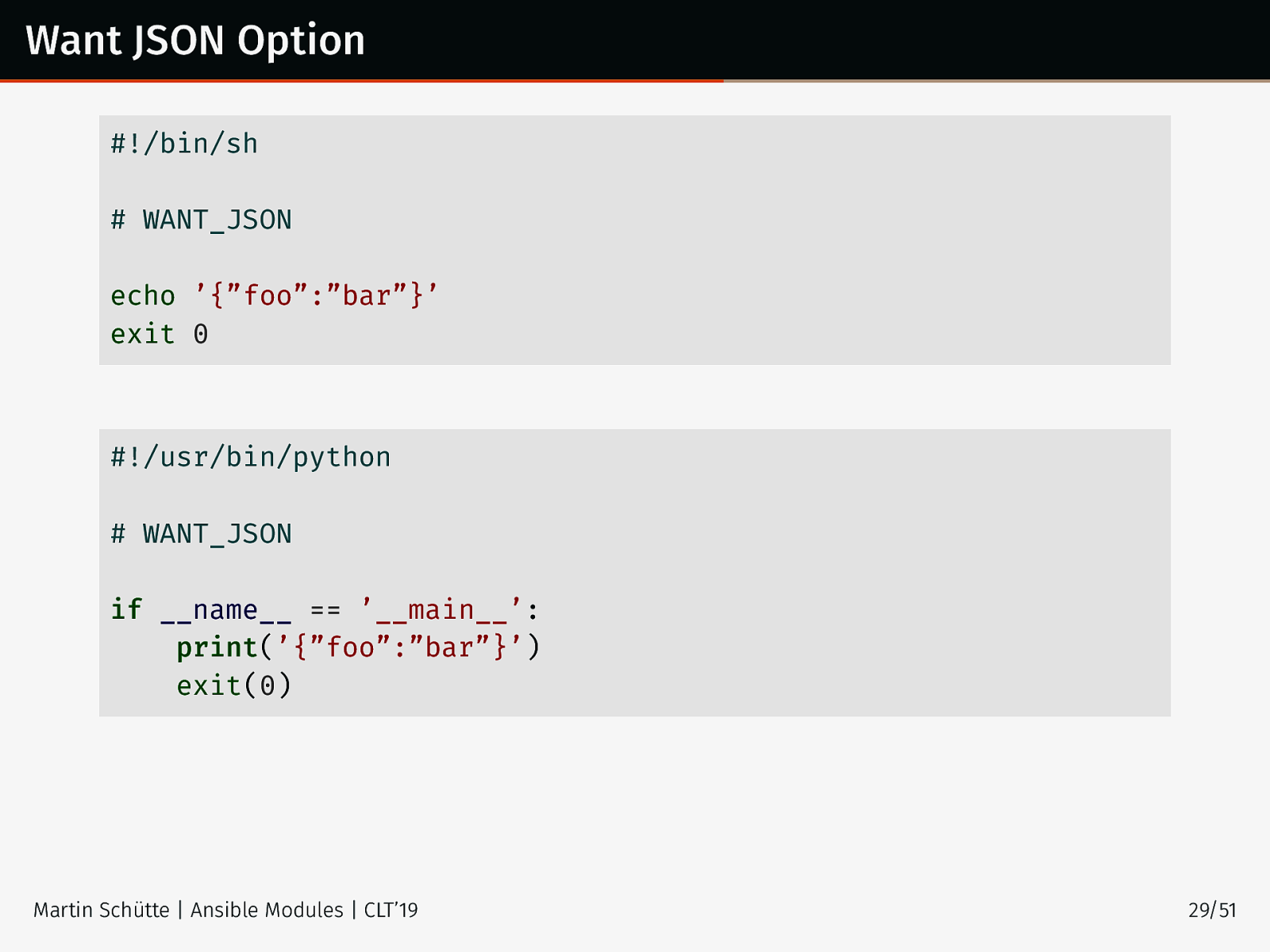
Want JSON Option #!/bin/sh # WANT_JSON echo ’{”foo”:”bar”}’ exit 0 #!/usr/bin/python # WANT_JSON if name == ’main’: print(’{”foo”:”bar”}’) exit(0) Martin Schütte | Ansible Modules | CLT’19 29/51
Slide 33
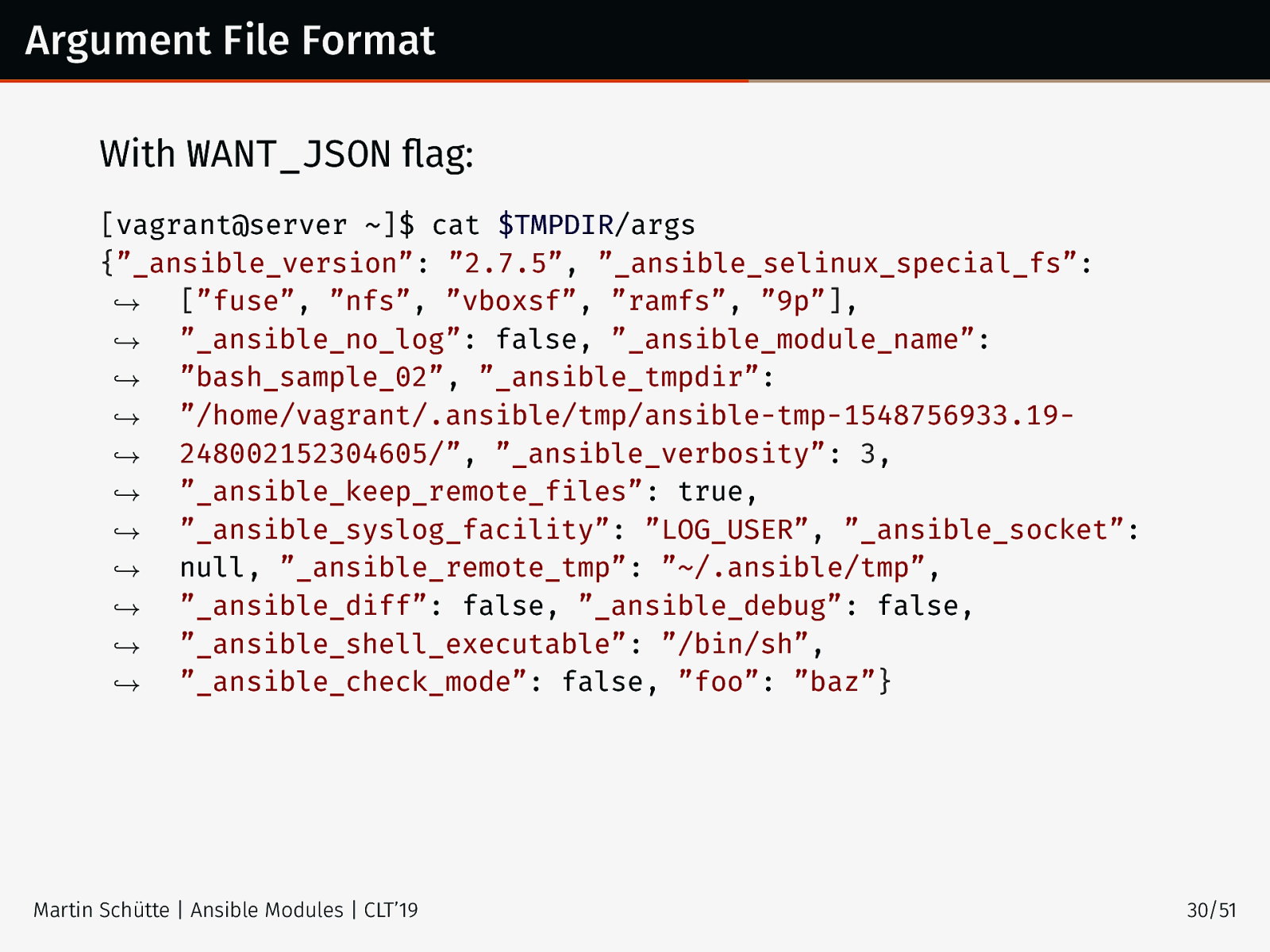
Argument File Format With WANT_JSON flag: [vagrant@server ~]$ cat $TMPDIR/args {”_ansible_version”: ”2.7.5”, ”_ansible_selinux_special_fs”: ,→ [”fuse”, ”nfs”, ”vboxsf”, ”ramfs”, ”9p”], ,→ ”_ansible_no_log”: false, ”_ansible_module_name”: ”bash_sample_02”, ”_ansible_tmpdir”: ,→ ”/home/vagrant/.ansible/tmp/ansible-tmp-1548756933.19,→ ,→ 248002152304605/”, ”_ansible_verbosity”: 3, ”_ansible_keep_remote_files”: true, ,→ ,→ ”_ansible_syslog_facility”: ”LOG_USER”, ”_ansible_socket”: ,→ null, ”_ansible_remote_tmp”: ”~/.ansible/tmp”, ,→ ”_ansible_diff”: false, ”_ansible_debug”: false, ,→ ”_ansible_shell_executable”: ”/bin/sh”, ,→ ”_ansible_check_mode”: false, ”foo”: ”baz”} Martin Schütte | Ansible Modules | CLT’19 30/51
Slide 34
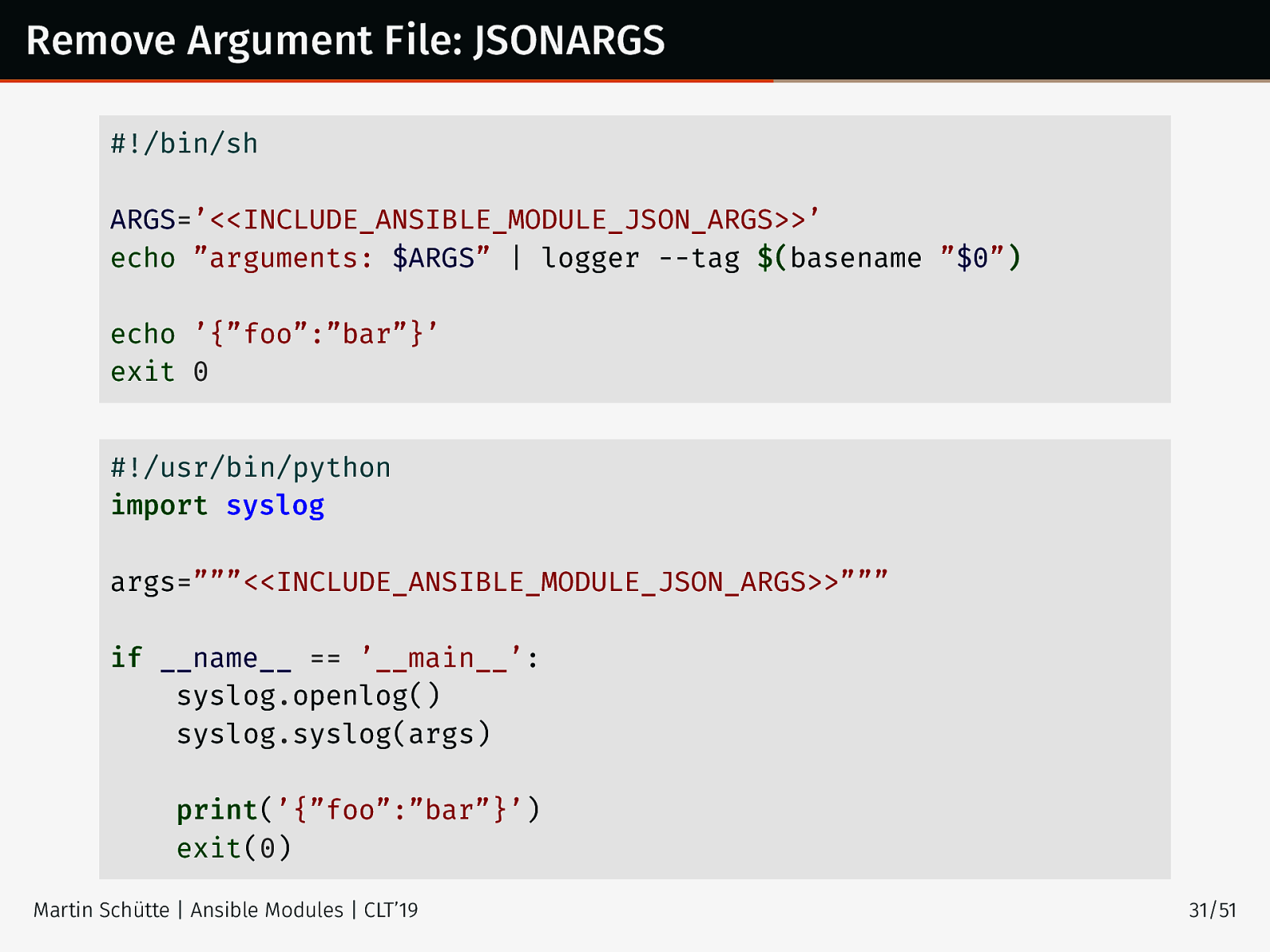
Remove Argument File: JSONARGS #!/bin/sh ARGS=’<<INCLUDE_ANSIBLE_MODULE_JSON_ARGS>>’ echo ”arguments: $ARGS” | logger —tag $(basename ”$0”) echo ’{”foo”:”bar”}’ exit 0 #!/usr/bin/python import syslog args=”””<<INCLUDE_ANSIBLE_MODULE_JSON_ARGS>>””” if name == ’main’: syslog.openlog() syslog.syslog(args) print(’{”foo”:”bar”}’) exit(0) Martin Schütte | Ansible Modules | CLT’19 31/51
Slide 35
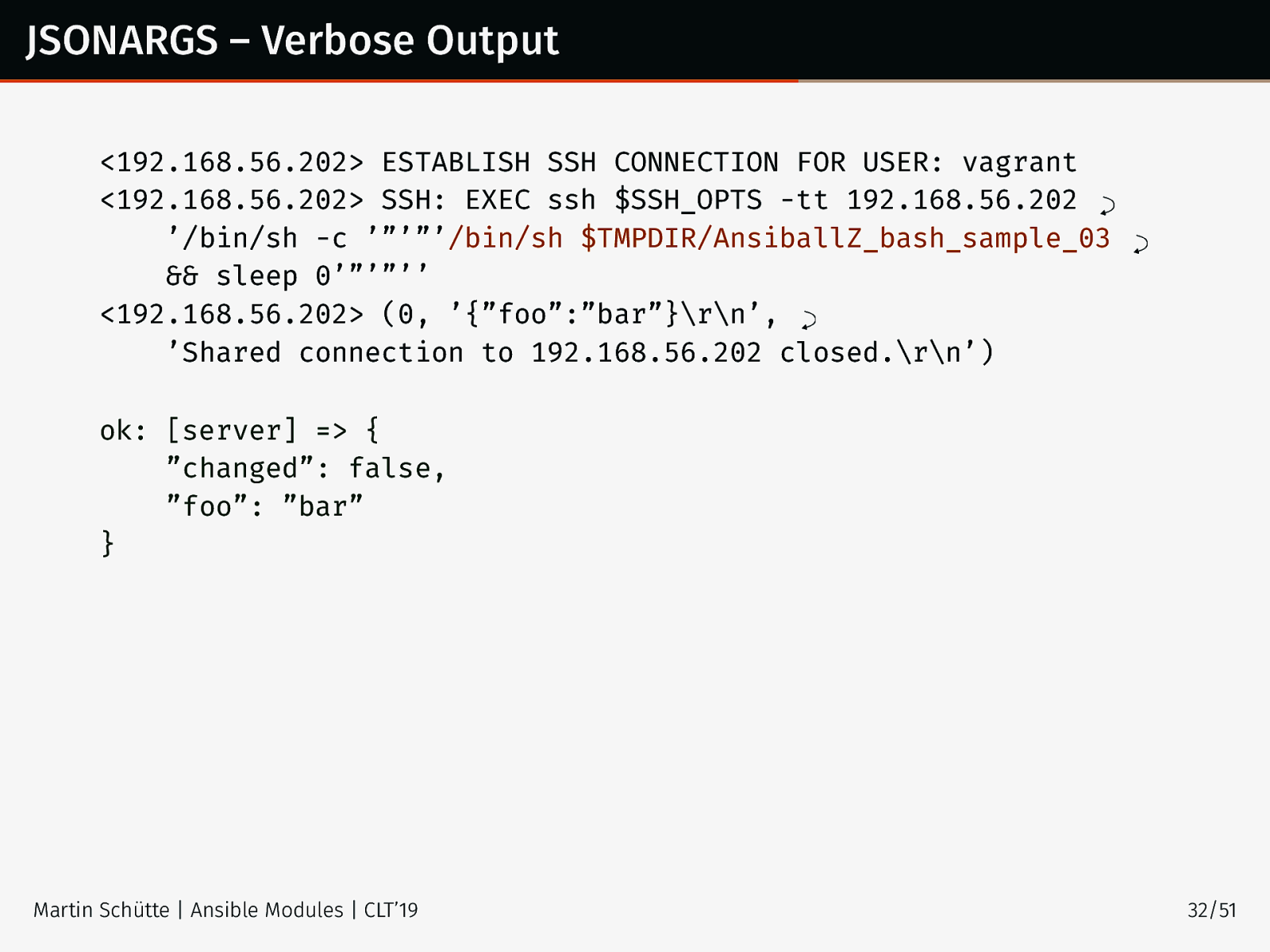
JSONARGS – Verbose Output <192.168.56.202> ESTABLISH SSH CONNECTION FOR USER: vagrant <192.168.56.202> SSH: EXEC ssh $SSH_OPTS -tt 192.168.56.202 ’/bin/sh -c ’”’”’/bin/sh $TMPDIR/AnsiballZ_bash_sample_03 && sleep 0’”’”’’ <192.168.56.202> (0, ’{”foo”:”bar”}\r\n’, ’Shared connection to 192.168.56.202 closed.\r\n’) C C C ok: [server] => { ”changed”: false, ”foo”: ”bar” } Martin Schütte | Ansible Modules | CLT’19 32/51
Slide 36
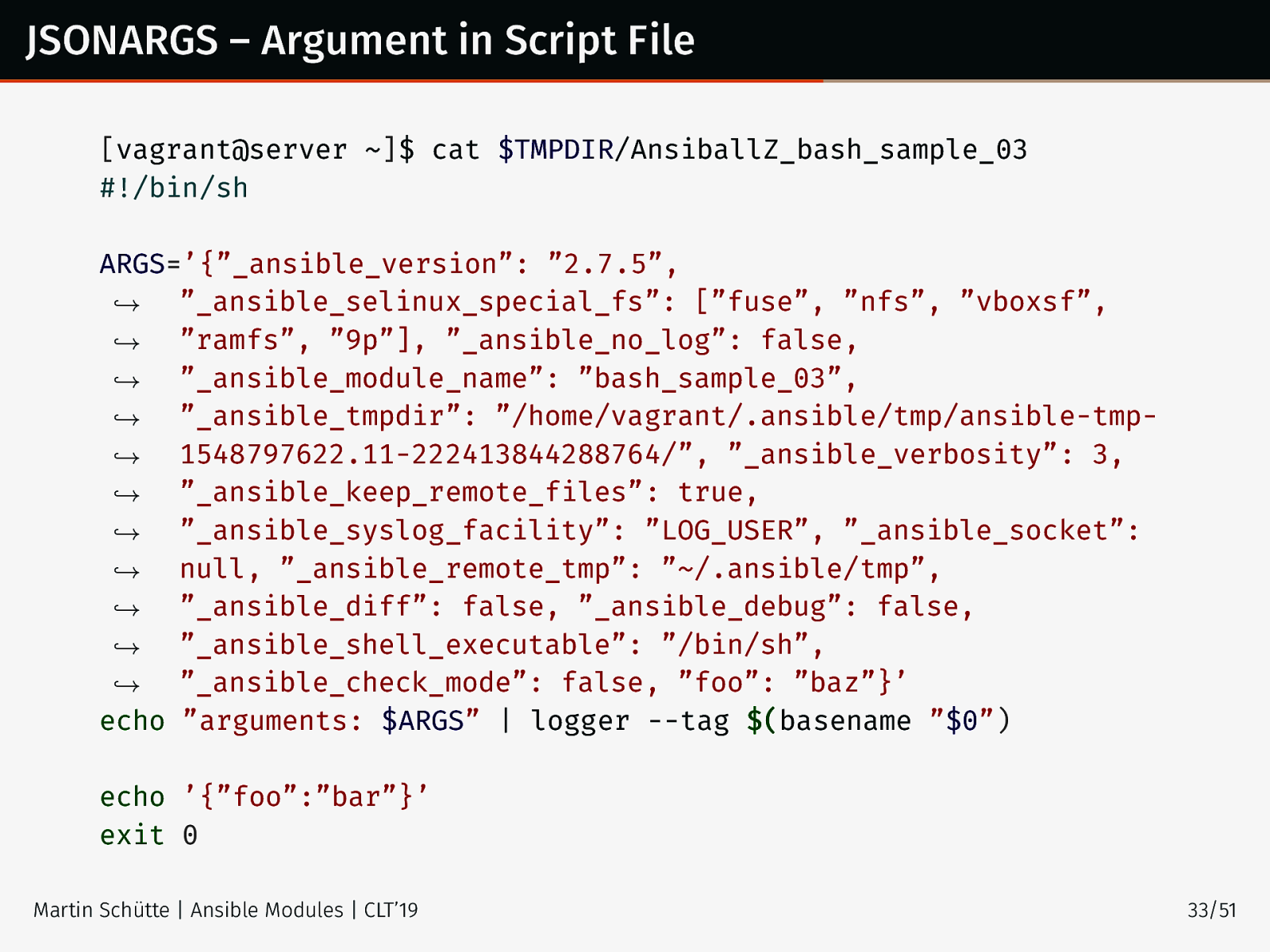
JSONARGS – Argument in Script File [vagrant@server ~]$ cat $TMPDIR/AnsiballZ_bash_sample_03 #!/bin/sh ARGS=’{”_ansible_version”: ”2.7.5”, ,→ ”_ansible_selinux_special_fs”: [”fuse”, ”nfs”, ”vboxsf”, ,→ ”ramfs”, ”9p”], ”_ansible_no_log”: false, ,→ ”_ansible_module_name”: ”bash_sample_03”, ,→ ”_ansible_tmpdir”: ”/home/vagrant/.ansible/tmp/ansible-tmp,→ 1548797622.11-222413844288764/”, ”_ansible_verbosity”: 3, ,→ ”_ansible_keep_remote_files”: true, ,→ ”_ansible_syslog_facility”: ”LOG_USER”, ”_ansible_socket”: ,→ null, ”_ansible_remote_tmp”: ”~/.ansible/tmp”, ,→ ”_ansible_diff”: false, ”_ansible_debug”: false, ,→ ”_ansible_shell_executable”: ”/bin/sh”, ,→ ”_ansible_check_mode”: false, ”foo”: ”baz”}’ echo ”arguments: $ARGS” | logger —tag $(basename ”$0”) echo ’{”foo”:”bar”}’ exit 0 Martin Schütte | Ansible Modules | CLT’19 33/51
Slide 37
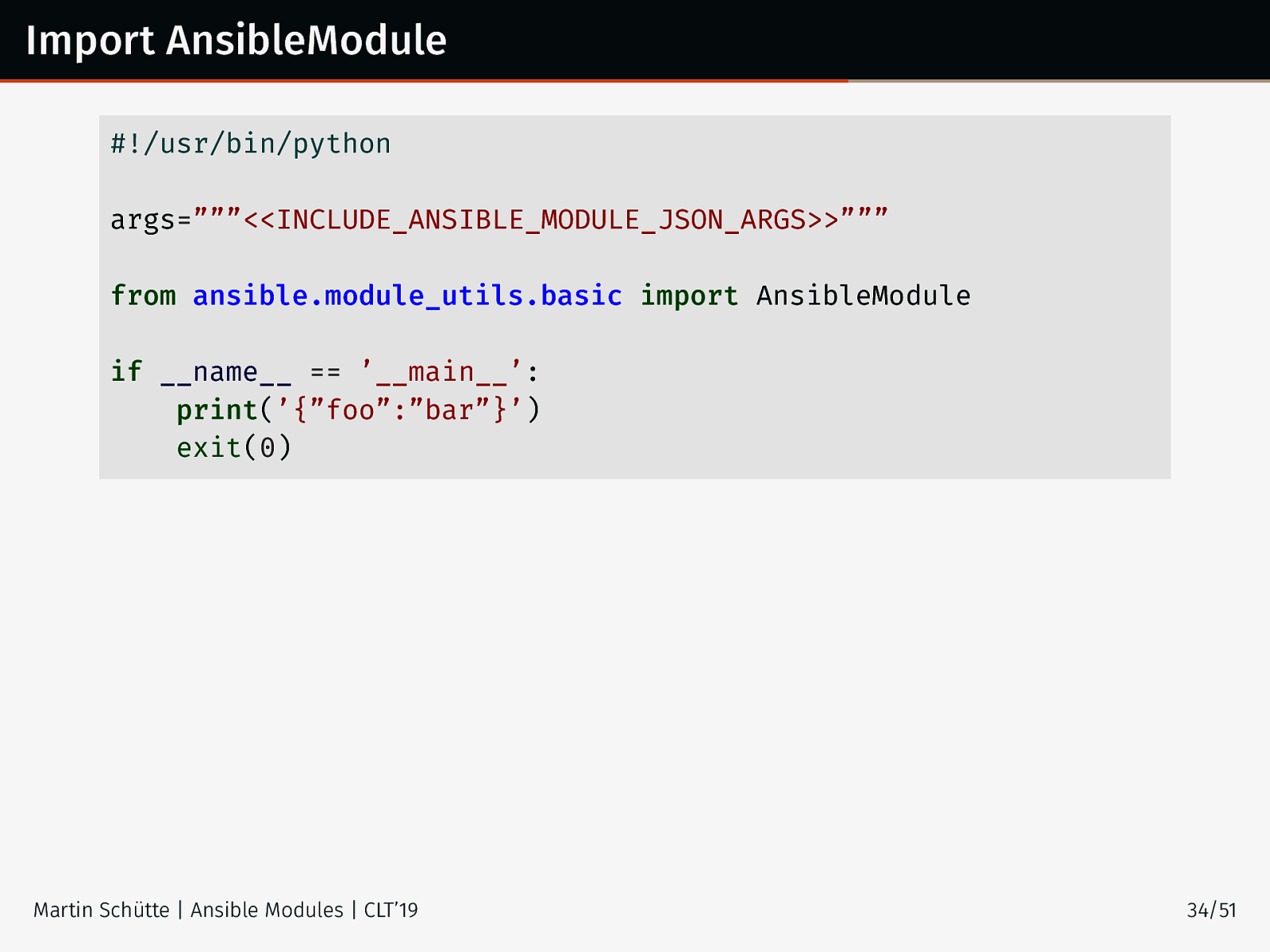
Import AnsibleModule #!/usr/bin/python args=”””<<INCLUDE_ANSIBLE_MODULE_JSON_ARGS>>””” from ansible.module_utils.basic import AnsibleModule if name == ’main’: print(’{”foo”:”bar”}’) exit(0) Martin Schütte | Ansible Modules | CLT’19 34/51
Slide 38
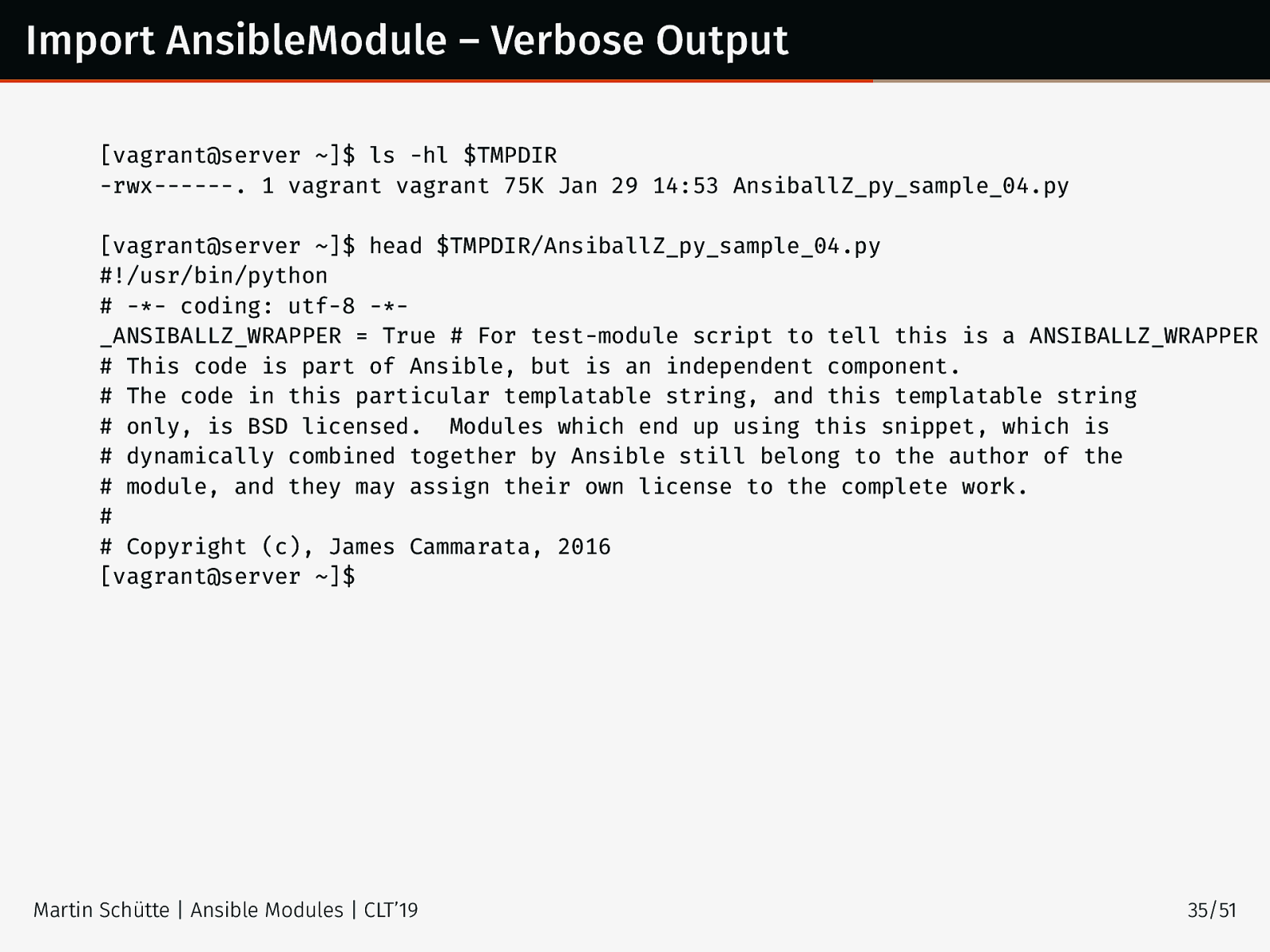
Import AnsibleModule – Verbose Output [vagrant@server ~]$ ls -hl $TMPDIR -rwx———. 1 vagrant vagrant 75K Jan 29 14:53 AnsiballZ_py_sample_04.py [vagrant@server ~]$ head $TMPDIR/AnsiballZ_py_sample_04.py #!/usr/bin/python # -- coding: utf-8 -_ANSIBALLZ_WRAPPER = True # For test-module script to tell this is a ANSIBALLZ_WRAPPER # This code is part of Ansible, but is an independent component. # The code in this particular templatable string, and this templatable string # only, is BSD licensed. Modules which end up using this snippet, which is # dynamically combined together by Ansible still belong to the author of the # module, and they may assign their own license to the complete work. # # Copyright (c), James Cammarata, 2016 [vagrant@server ~]$ Martin Schütte | Ansible Modules | CLT’19 35/51
Slide 39
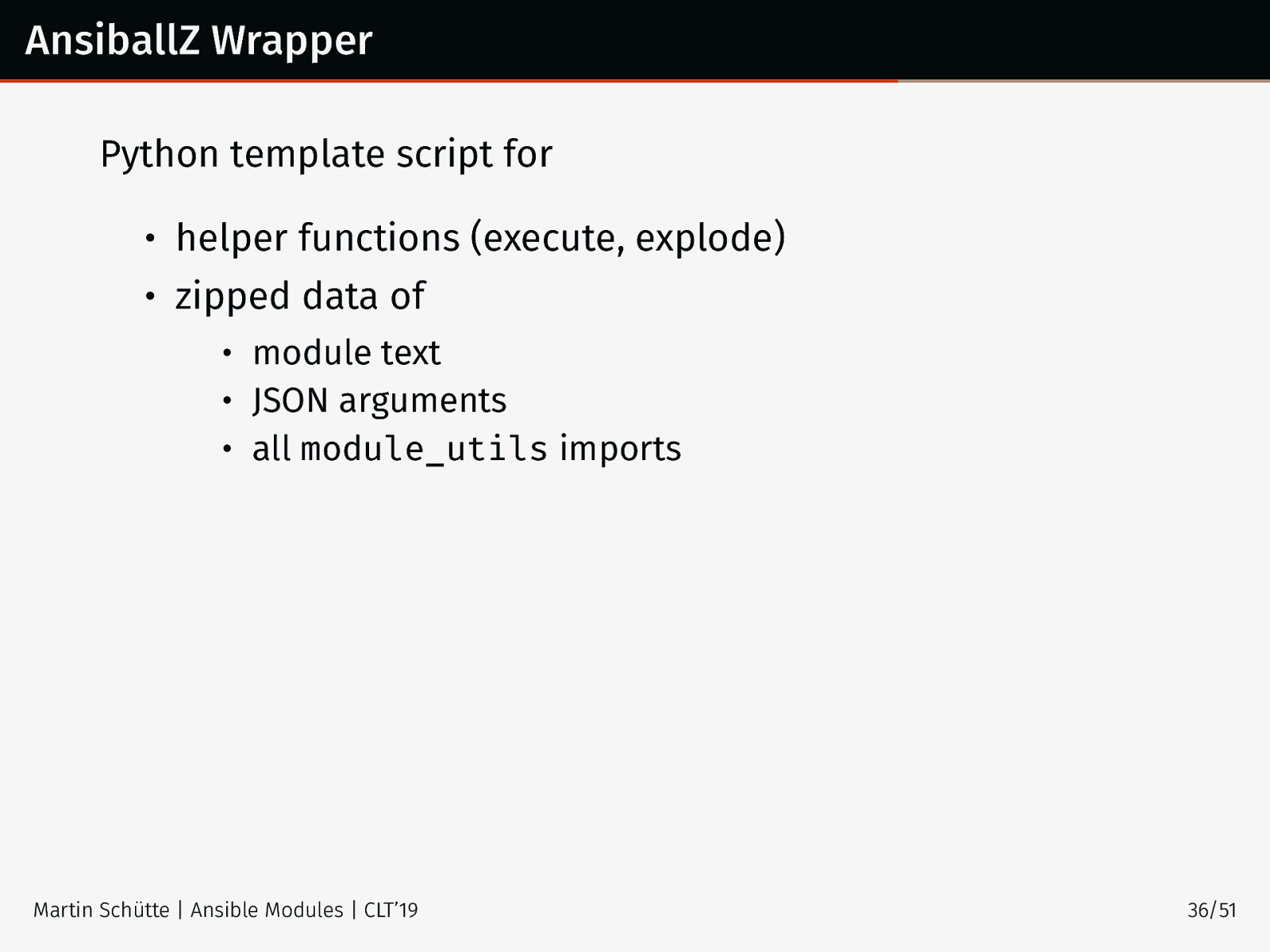
AnsiballZ Wrapper Python template script for • helper functions (execute, explode) • zipped data of • module text • JSON arguments • all module_utils imports Martin Schütte | Ansible Modules | CLT’19 36/51
Slide 40
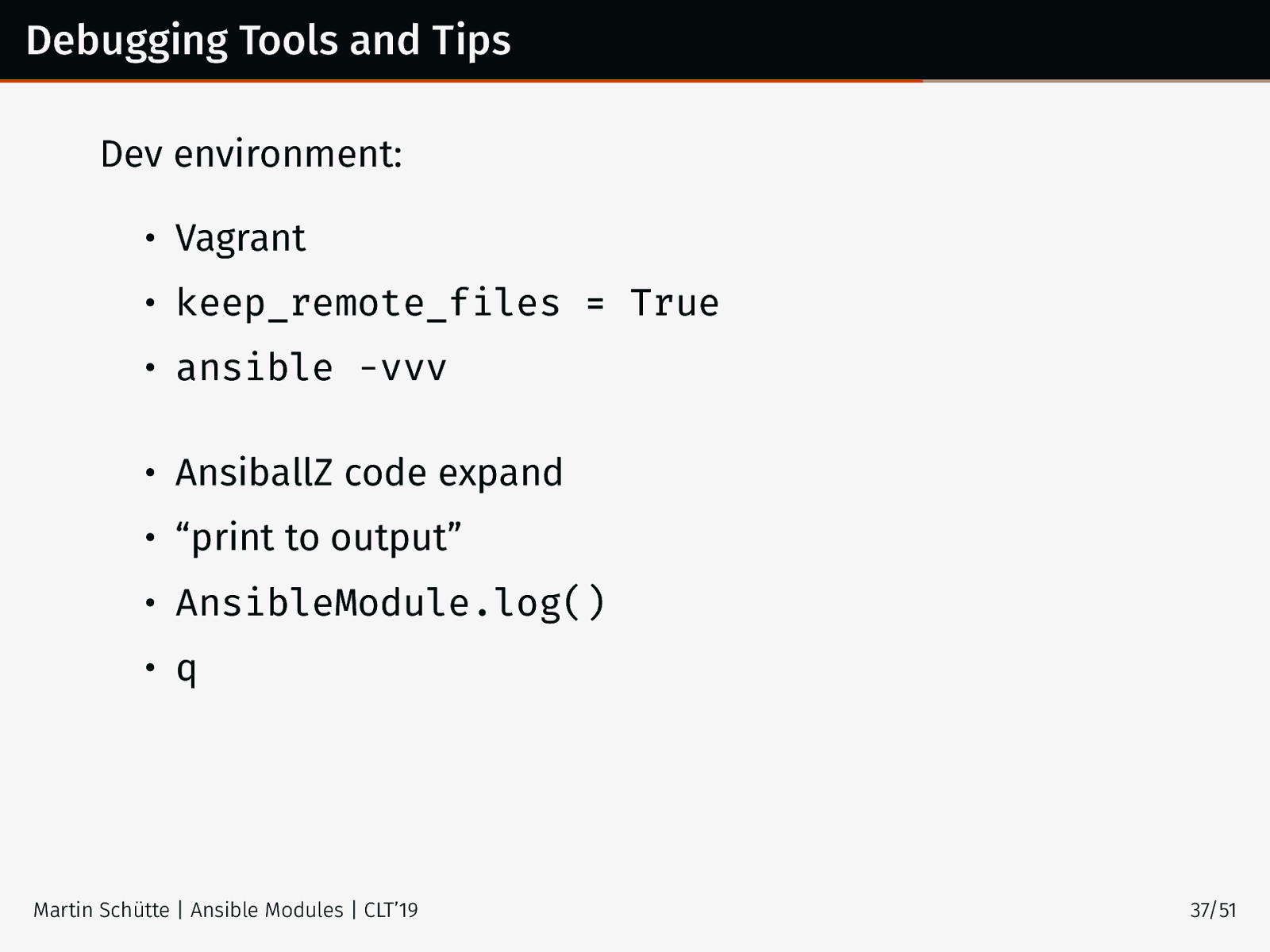
Debugging Tools and Tips Dev environment: • Vagrant • keep_remote_files = True • ansible -vvv • AnsiballZ code expand • “print to output” • AnsibleModule.log() • q Martin Schütte | Ansible Modules | CLT’19 37/51
Slide 41
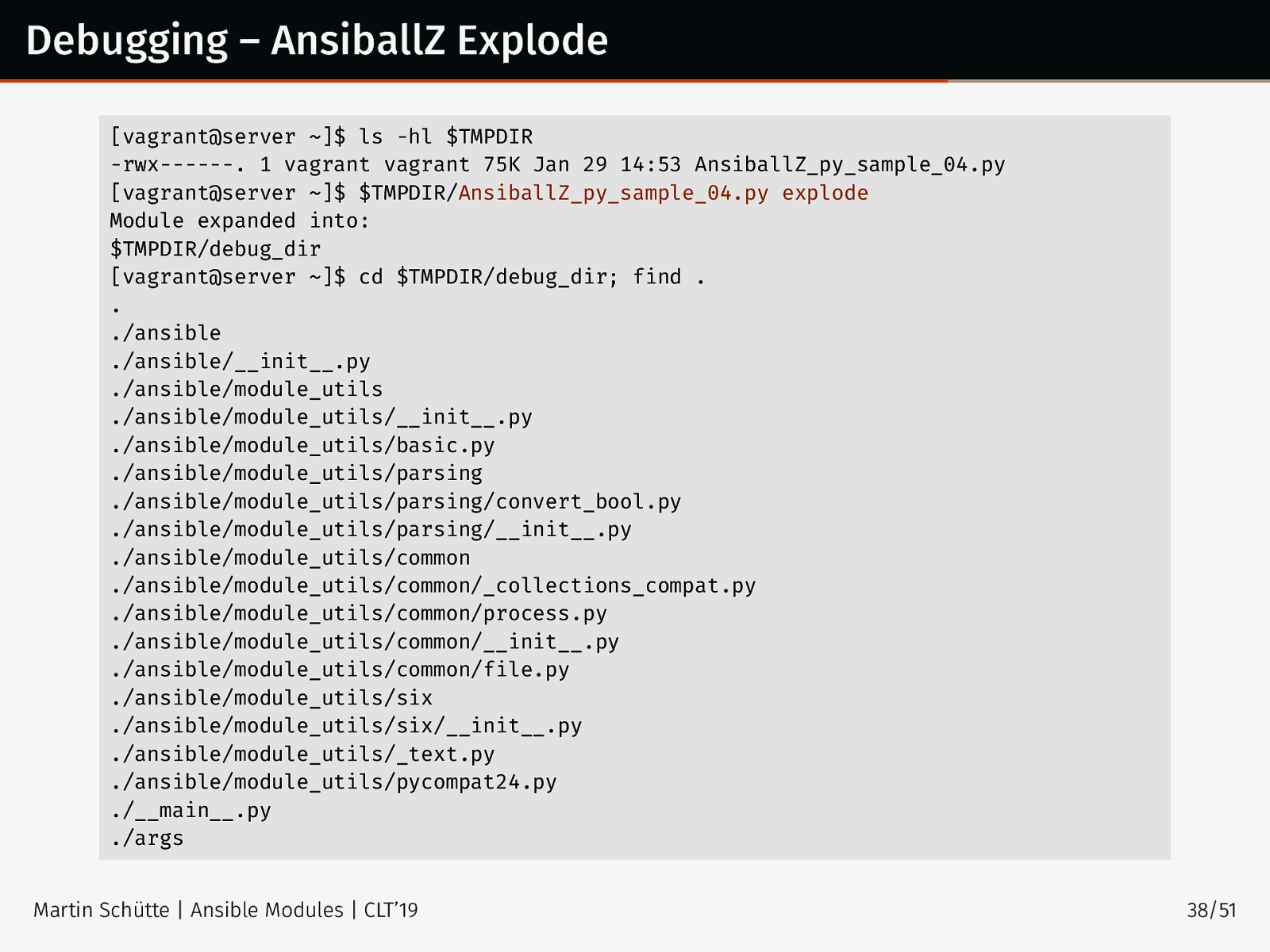
Debugging – AnsiballZ Explode [vagrant@server ~]$ ls -hl $TMPDIR -rwx———. 1 vagrant vagrant 75K Jan 29 14:53 AnsiballZ_py_sample_04.py [vagrant@server ~]$ $TMPDIR/AnsiballZ_py_sample_04.py explode Module expanded into: $TMPDIR/debug_dir [vagrant@server ~]$ cd $TMPDIR/debug_dir; find …/ansible ./ansible/init.py ./ansible/module_utils ./ansible/module_utils/init.py ./ansible/module_utils/basic.py ./ansible/module_utils/parsing ./ansible/module_utils/parsing/convert_bool.py ./ansible/module_utils/parsing/init.py ./ansible/module_utils/common ./ansible/module_utils/common/_collections_compat.py ./ansible/module_utils/common/process.py ./ansible/module_utils/common/init.py ./ansible/module_utils/common/file.py ./ansible/module_utils/six ./ansible/module_utils/six/init.py ./ansible/module_utils/_text.py ./ansible/module_utils/pycompat24.py ./main.py ./args Martin Schütte | Ansible Modules | CLT’19 38/51
Slide 42
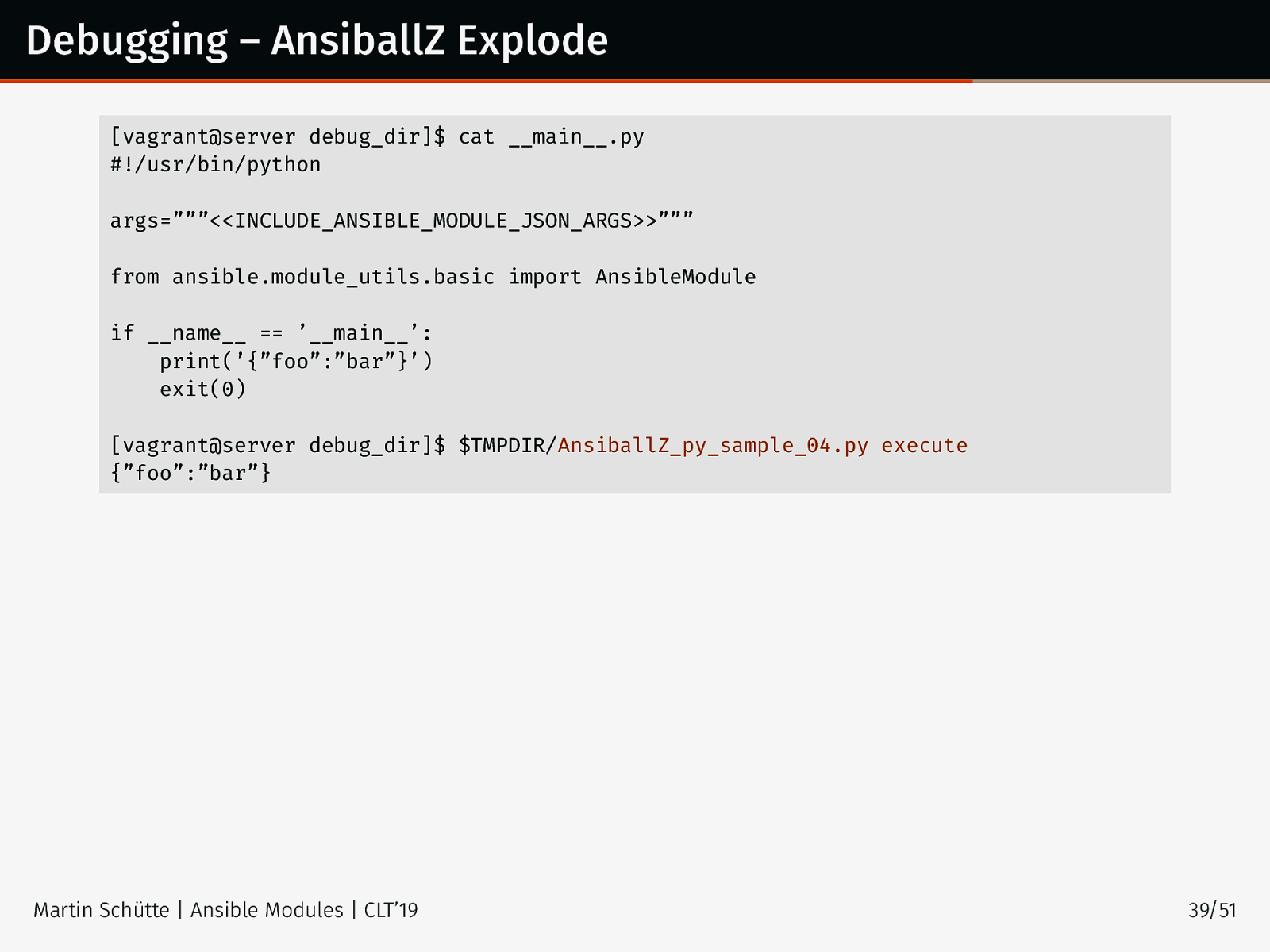
Debugging – AnsiballZ Explode [vagrant@server debug_dir]$ cat main.py #!/usr/bin/python args=”””<<INCLUDE_ANSIBLE_MODULE_JSON_ARGS>>””” from ansible.module_utils.basic import AnsibleModule if name == ’main’: print(’{”foo”:”bar”}’) exit(0) [vagrant@server debug_dir]$ $TMPDIR/AnsiballZ_py_sample_04.py execute {”foo”:”bar”} Martin Schütte | Ansible Modules | CLT’19 39/51
Slide 43
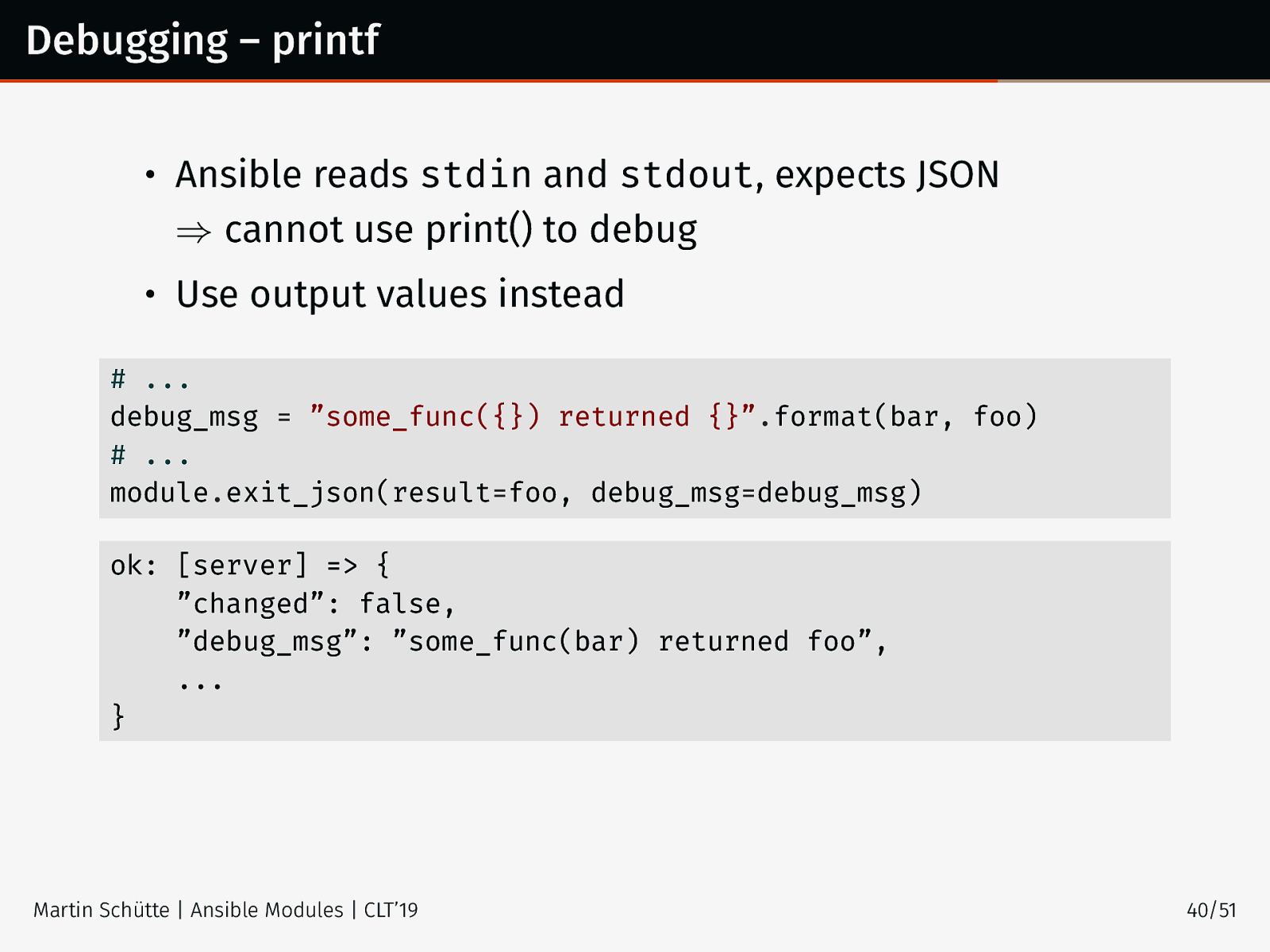
Debugging – printf • Ansible reads stdin and stdout, expects JSON ⇒ cannot use print() to debug • Use output values instead # … debug_msg = ”some_func({}) returned {}”.format(bar, foo) # … module.exit_json(result=foo, debug_msg=debug_msg) ok: [server] => { ”changed”: false, ”debug_msg”: ”some_func(bar) returned foo”, … } Martin Schütte | Ansible Modules | CLT’19 40/51
Slide 44
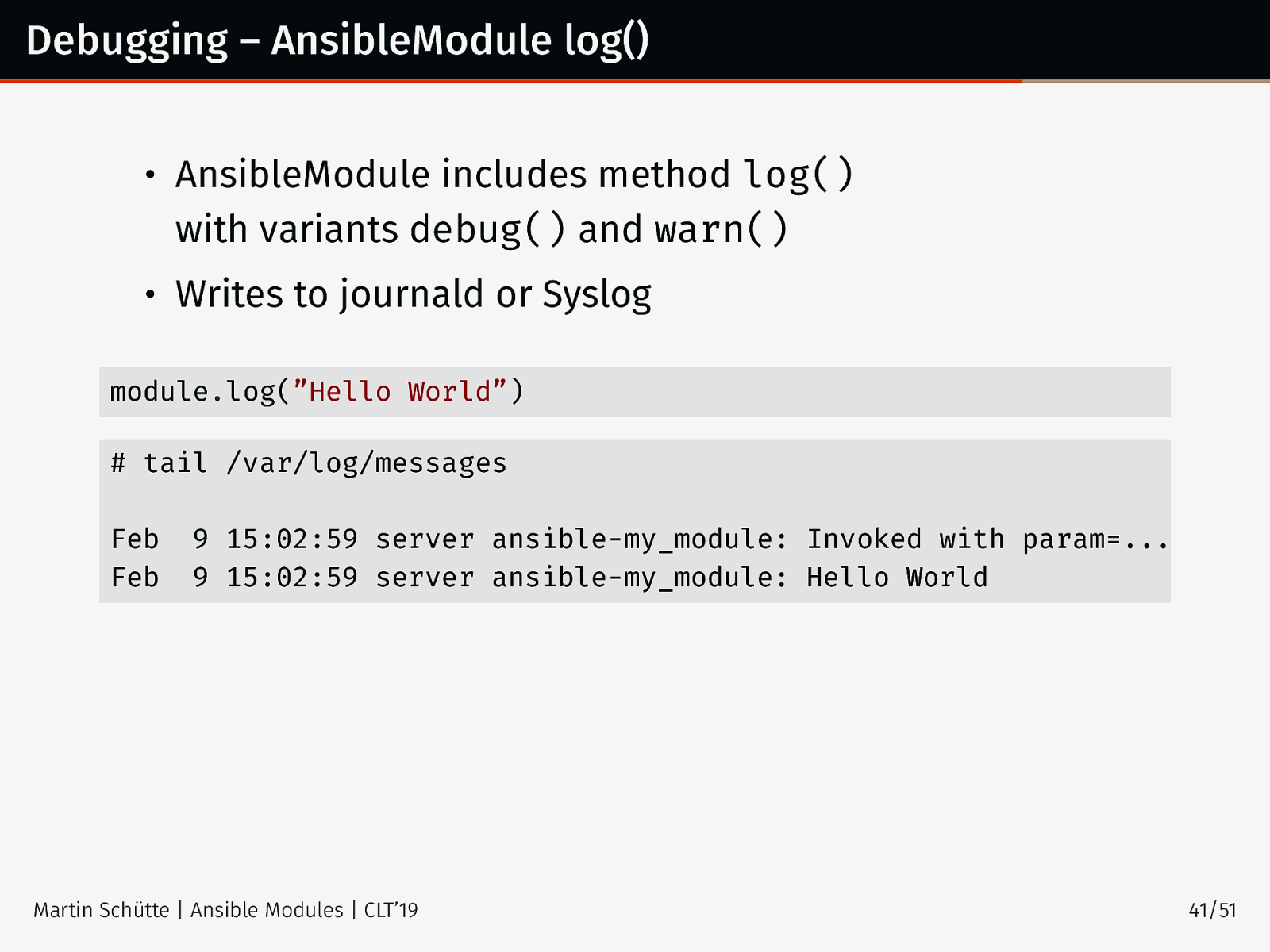
Debugging – AnsibleModule log() • AnsibleModule includes method log() with variants debug() and warn() • Writes to journald or Syslog module.log(”Hello World”) # tail /var/log/messages Feb Feb 9 15:02:59 server ansible-my_module: Invoked with param=… 9 15:02:59 server ansible-my_module: Hello World Martin Schütte | Ansible Modules | CLT’19 41/51
Slide 45
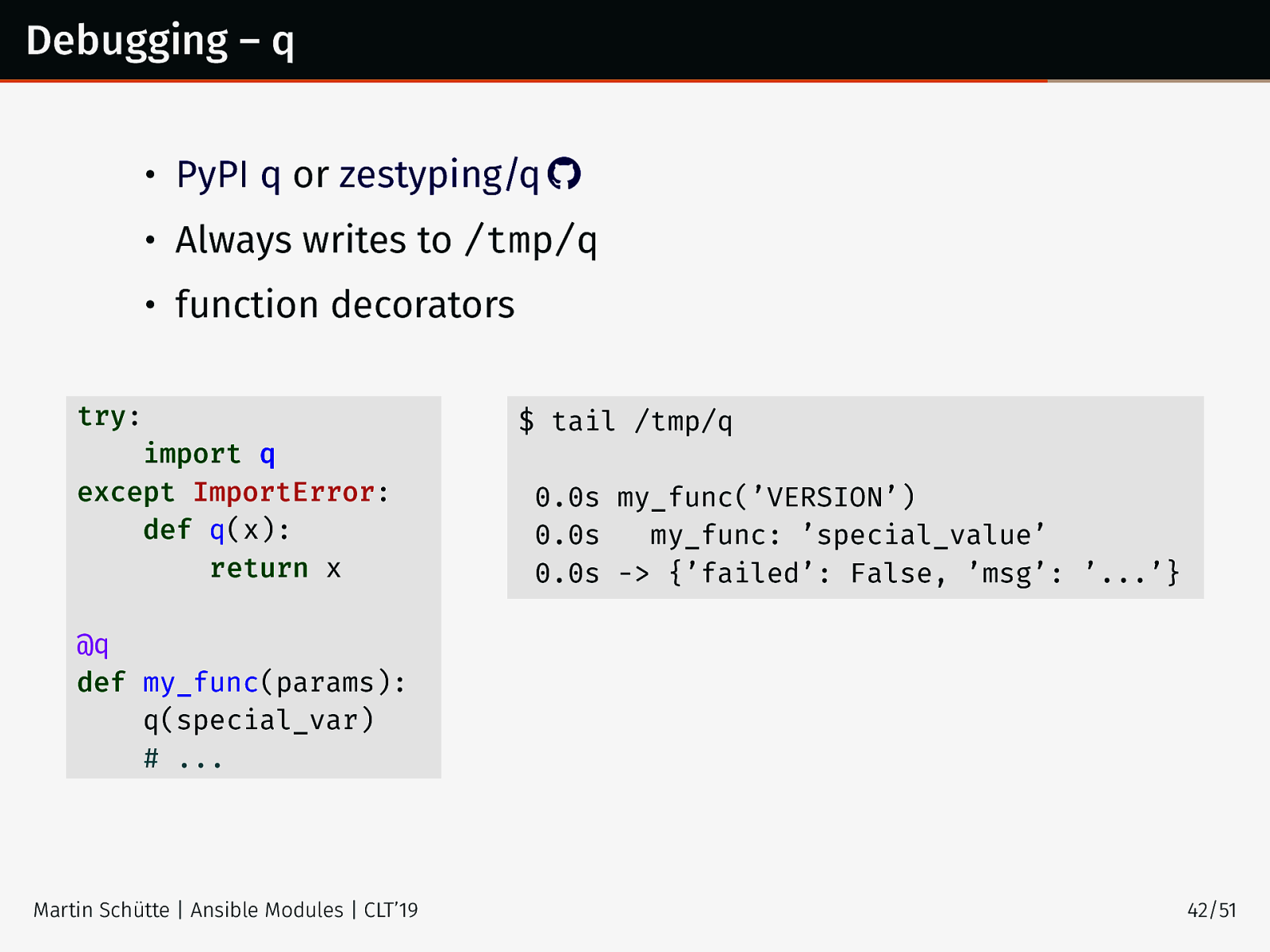
Debugging – q • PyPI q or zestyping/q • Always writes to /tmp/q • function decorators try: import q except ImportError: def q(x): return x $ tail /tmp/q 0.0s my_func(’VERSION’) 0.0s my_func: ’special_value’ 0.0s -> {’failed’: False, ’msg’: ’…’} @q def my_func(params): q(special_var) # … Martin Schütte | Ansible Modules | CLT’19 42/51
Slide 46

Beyond Python
Slide 47
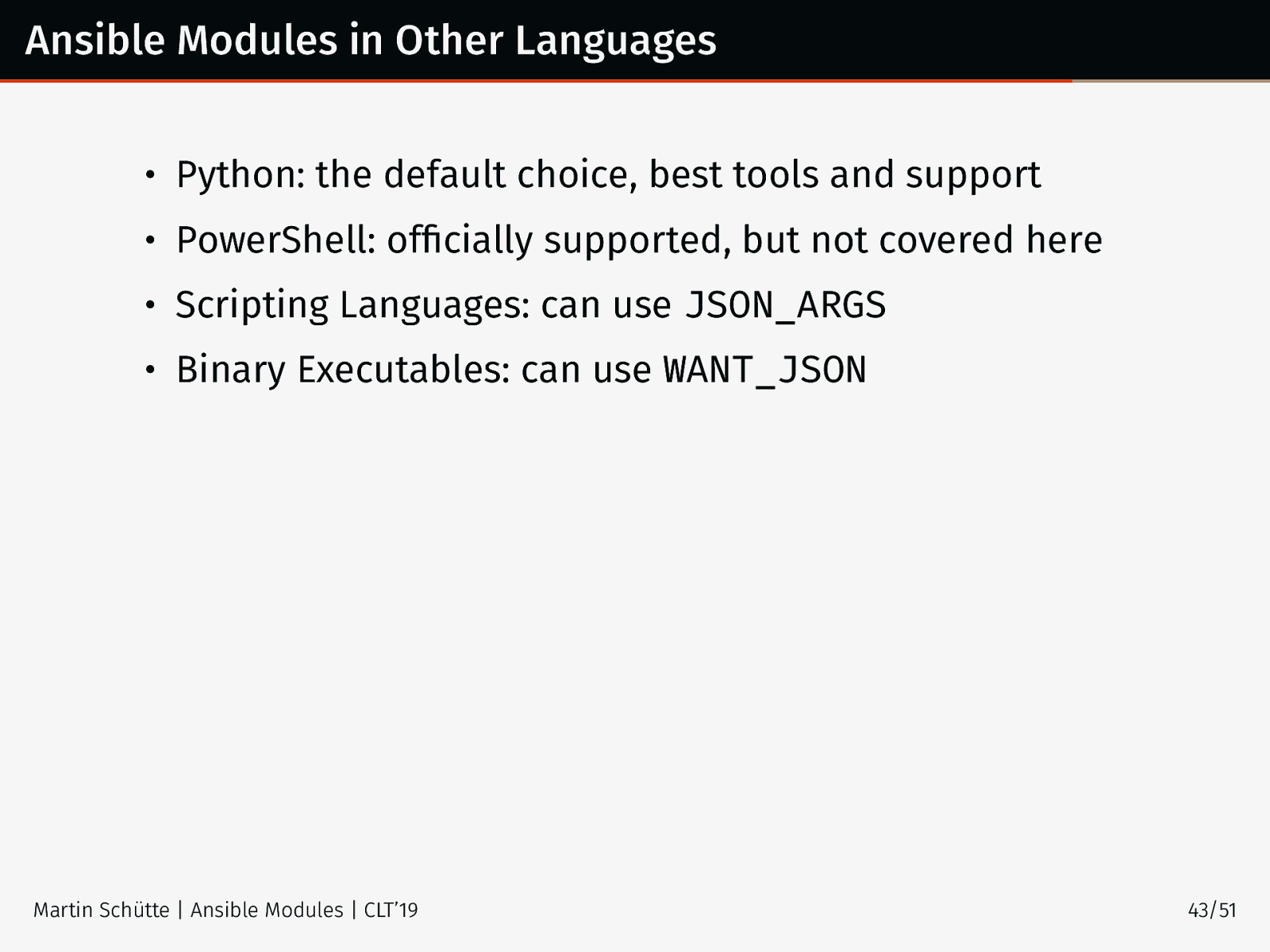
Ansible Modules in Other Languages • Python: the default choice, best tools and support • PowerShell: officially supported, but not covered here • Scripting Languages: can use JSON_ARGS • Binary Executables: can use WANT_JSON Martin Schütte | Ansible Modules | CLT’19 43/51
Slide 48
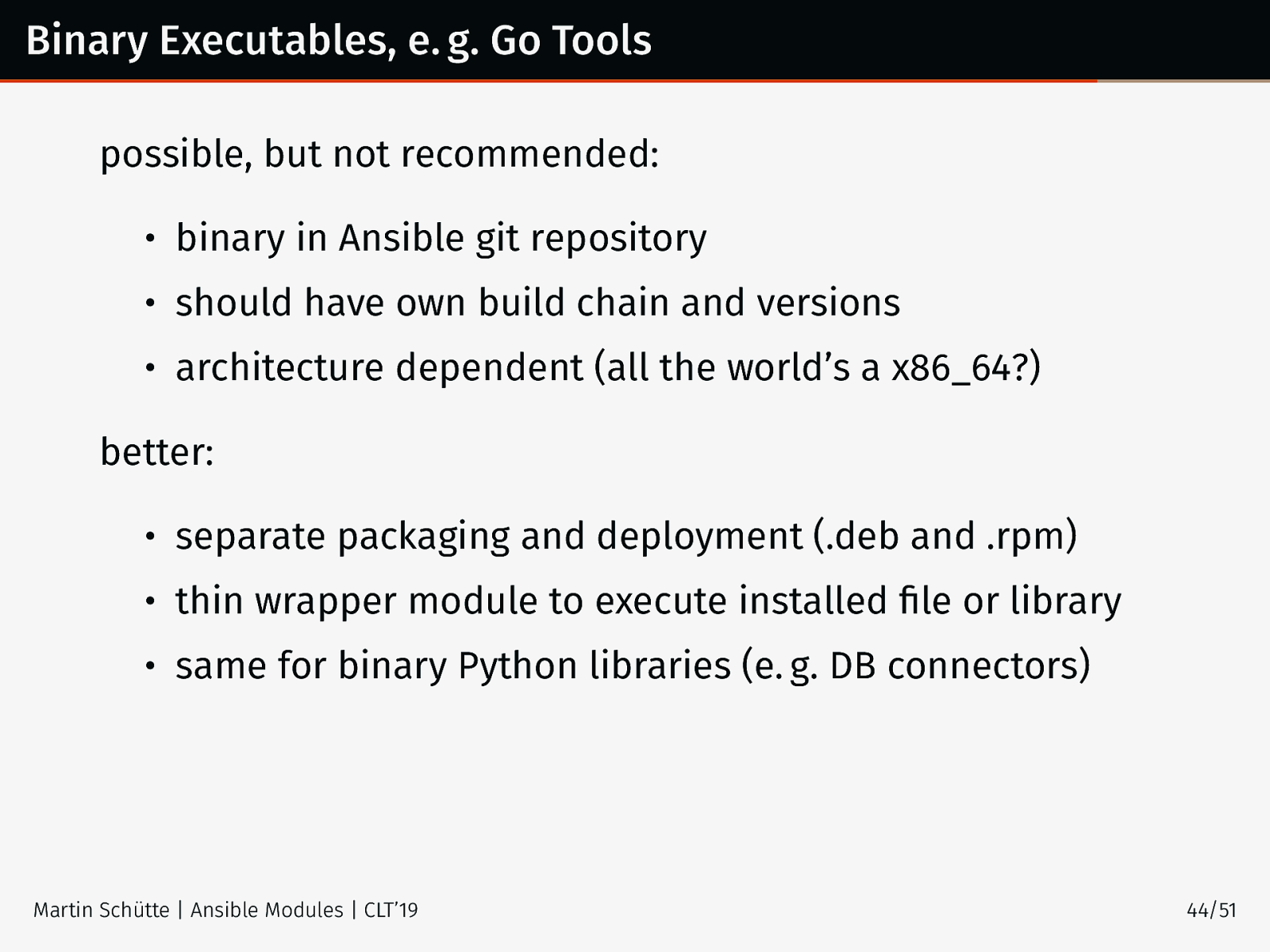
Binary Executables, e. g. Go Tools possible, but not recommended: • binary in Ansible git repository • should have own build chain and versions • architecture dependent (all the world’s a x86_64?) better: • separate packaging and deployment (.deb and .rpm) • thin wrapper module to execute installed file or library • same for binary Python libraries (e. g. DB connectors) Martin Schütte | Ansible Modules | CLT’19 44/51
Slide 49
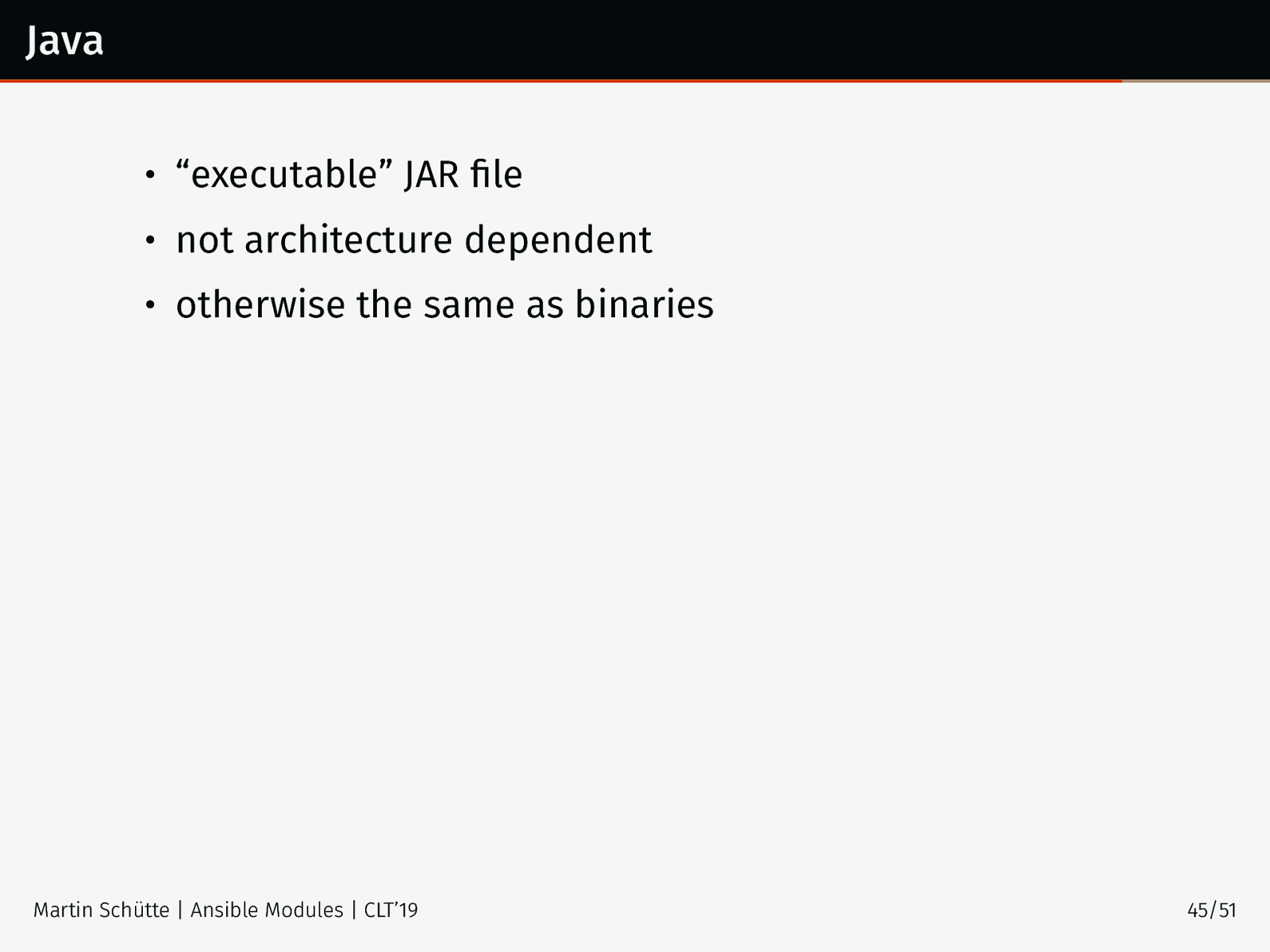
Java • “executable” JAR file • not architecture dependent • otherwise the same as binaries Martin Schütte | Ansible Modules | CLT’19 45/51
Slide 50
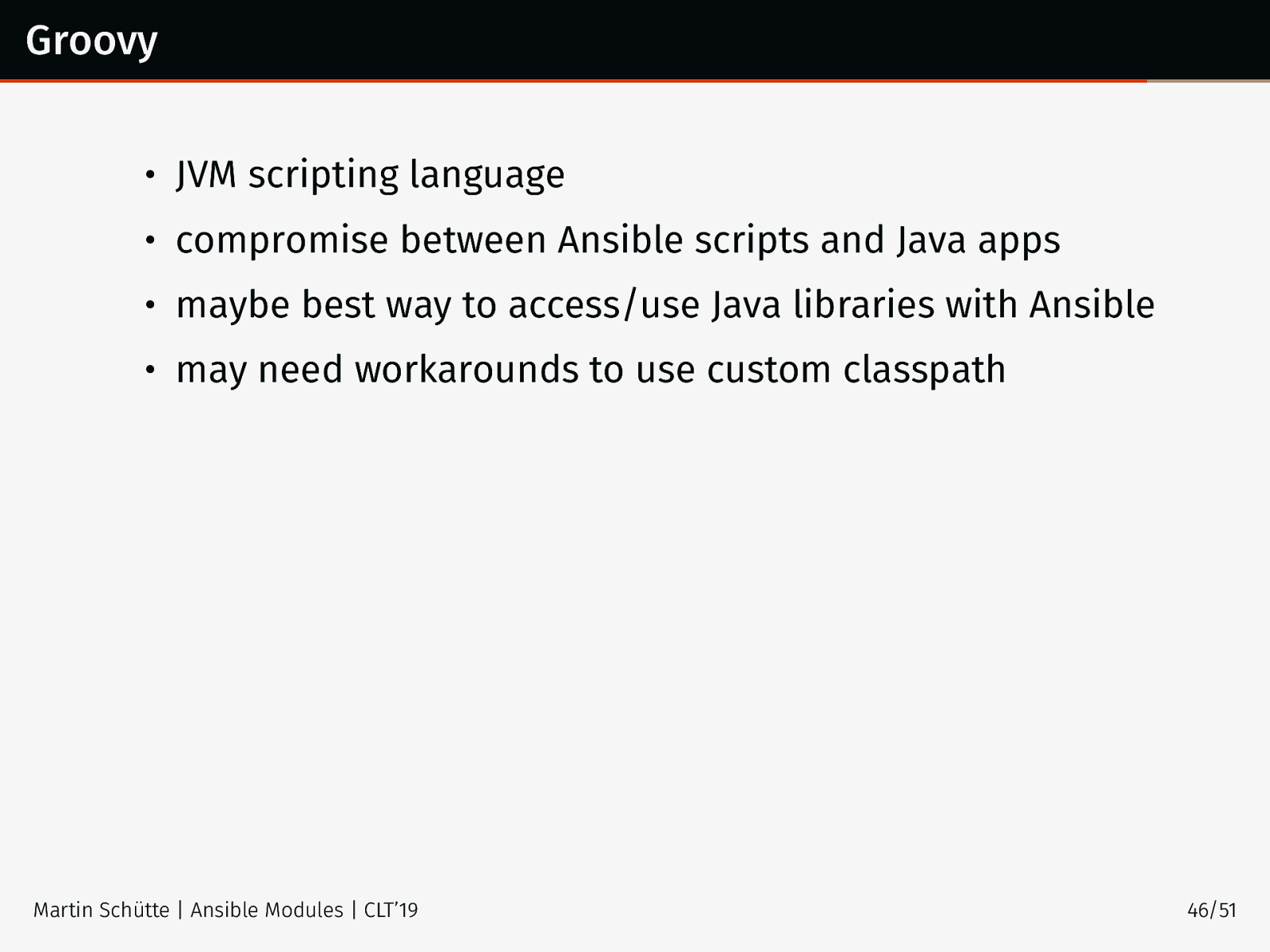
Groovy • JVM scripting language • compromise between Ansible scripts and Java apps • maybe best way to access/use Java libraries with Ansible • may need workarounds to use custom classpath Martin Schütte | Ansible Modules | CLT’19 46/51
Slide 51
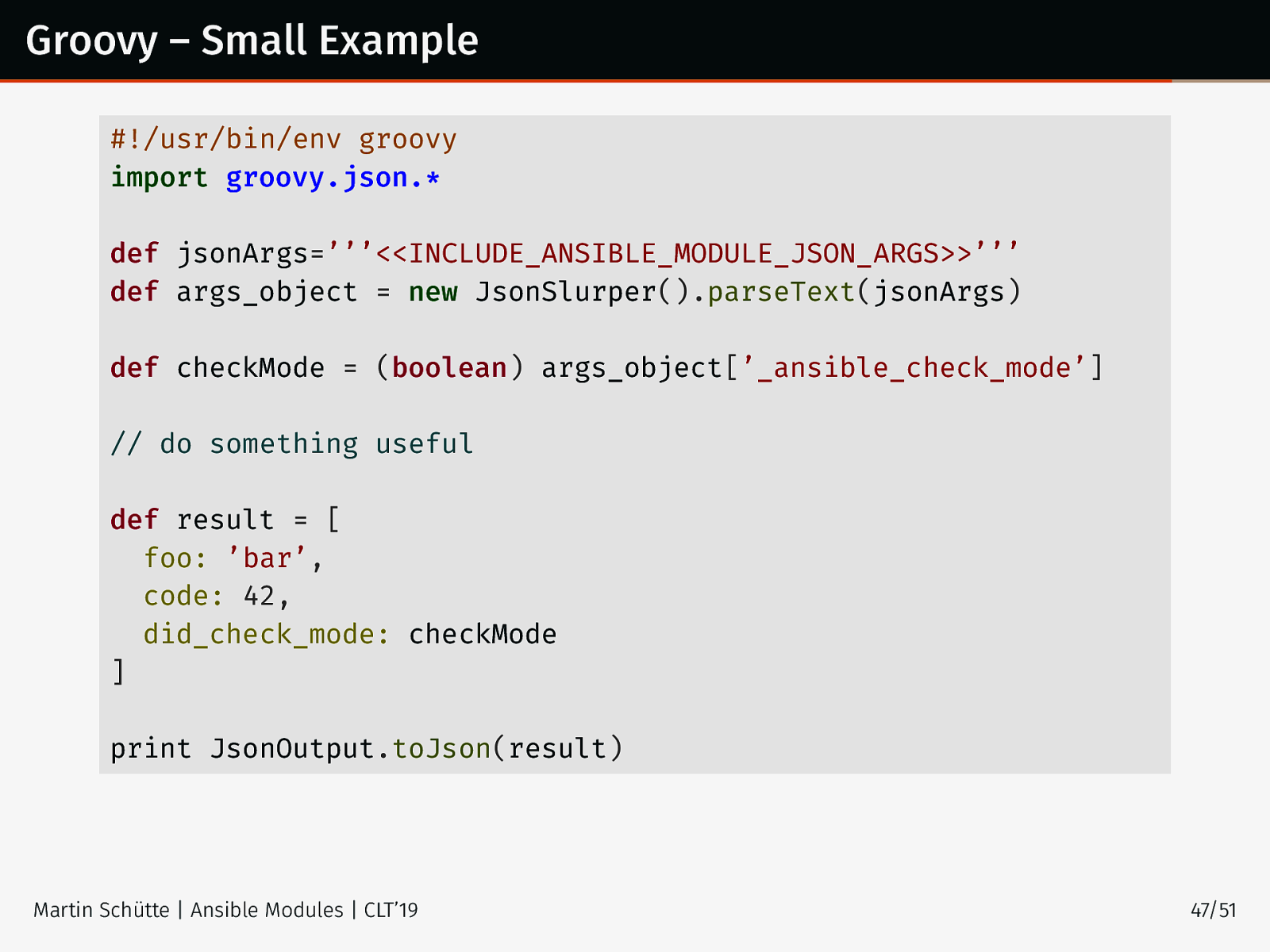
Groovy – Small Example #!/usr/bin/env groovy import groovy.json.* def jsonArgs=’’’<<INCLUDE_ANSIBLE_MODULE_JSON_ARGS>>’’’ def args_object = new JsonSlurper().parseText(jsonArgs) def checkMode = (boolean) args_object[’_ansible_check_mode’] // do something useful def result = [ foo: ’bar’, code: 42, did_check_mode: checkMode ] print JsonOutput.toJson(result) Martin Schütte | Ansible Modules | CLT’19 47/51
Slide 52
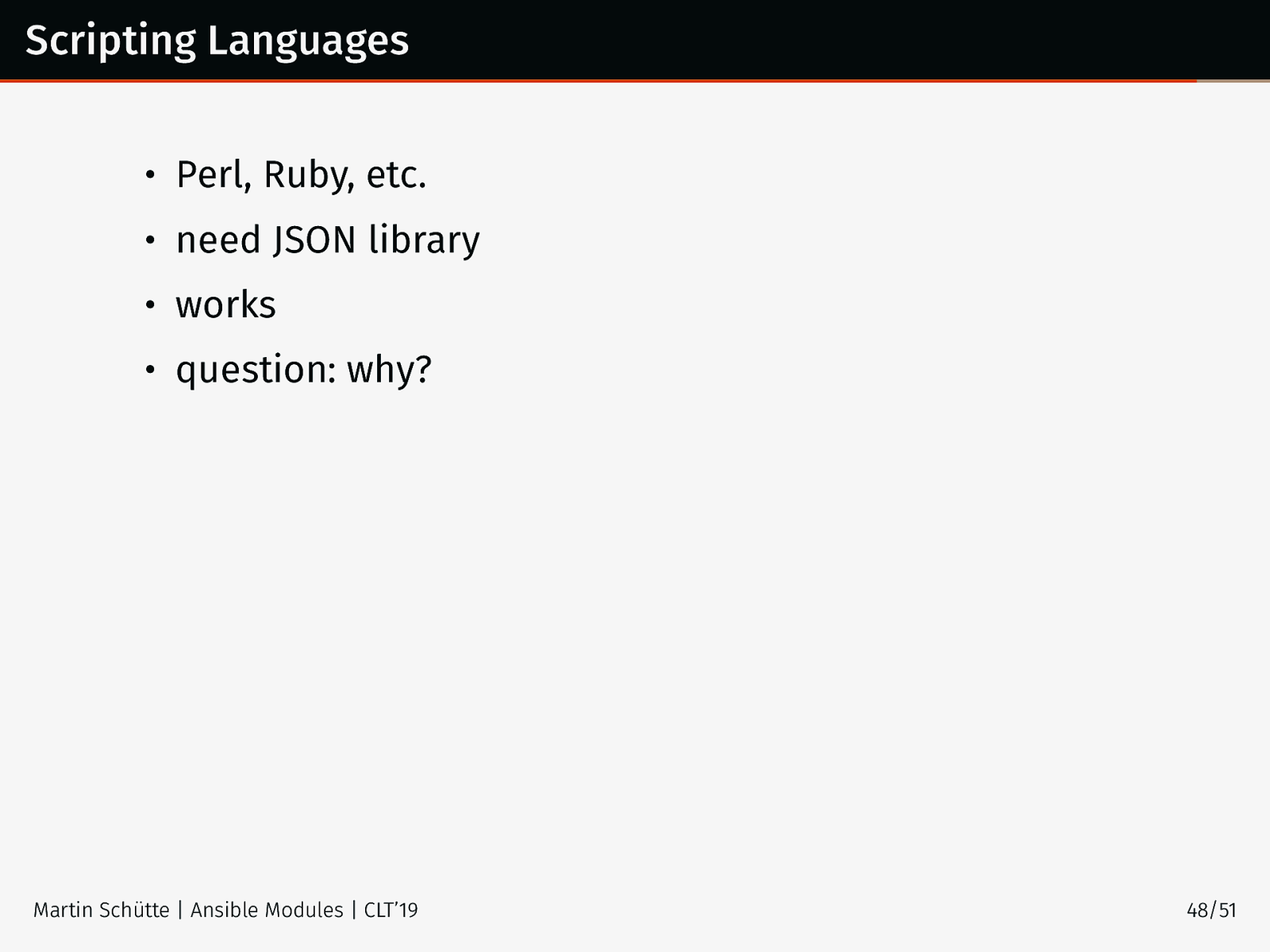
Scripting Languages • Perl, Ruby, etc. • need JSON library • works • question: why? Martin Schütte | Ansible Modules | CLT’19 48/51
Slide 53

Conclusion
Slide 54

Useful Software Design Principles Not only for Ansible modules … • KISS • YAGNI • readability! Martin Schütte | Ansible Modules | CLT’19 49/51
Slide 55

Links • Ansible Docs on Modules: Conventions, tips, and pitfalls • ansible/ansible • Ansible: Up & Running, 2nd ed by Lorin Hochstein & René Moser Martin Schütte | Ansible Modules | CLT’19 50/51
Slide 56

The End Thank You! — Questions? Martin Schütte @m_schuett info@martin-schuette.de slideshare.net/mschuett/ noti.st/mschuett/ Martin Schütte | Ansible Modules | CLT’19 51/51